Loraine Tulleken's Blog
February 5, 2017
I���M GIVING UP TRUMP FOR LENT
I'd spent hours glued to CNN and BBC, watching the unfolding saga of Donald Trump's first 100 days as America's newest President. As a political and news junky I was overdosing on talking heads. Half in jest I posted on Facebook: "I'm seriously considering giving up Donald Trump for Lent."
The response was great: 140 likes/loves, four shares and 26 comments. Oh, and I zapped a Facebook 'friend' who loves The Donald and called me an ugly old witch.

All light relief from the right-wing bigotry of a tweeting billionaire with a false tan and funny hair who looks set to hurtle us into World War 3. I was on a roll ��� until I received an invitation to lead a quiet morning for our diocese. What a wake-up call! Initially, I was gobsmacked. You see, I���m not a quiet priest and I���m far from holy. So, I told my caller I���d think about it and let her know the following day.
I had a ready excuse: ���Thanks, but I���m too busy���.
Now, unlike so many other good Anglicans, I���ve never had God or Jesus or the Holy Spirit speak directly to me but occasionally I get a spiritual zap that stops me in my tracks.
I pondered the Diocesan invitation. If I did accept what would the theme be? Where am I spiritually? What right do I have to guide people, who unlike me, are not ���too busy��� to devote quiet space to God?
I prayed. Not a Tweet from heaven. But the vitriolic response from the Trump fan I���d de-friended kept rattling. It was like a stubborn tune that becomes an unsolicited soundtrack and it signalled that I���d reacted exactly as Trump would have. I���m wielding social media as a weapon.
Then it hit me, I���d lost the plot ��� too quick to demonise and dehumanise.
In the frenzy of interacting with some 4000 Facebook and 5000 Twitter followers I was so busy being smart-assed I had shelved God in cyberspace.
I did accept the invitation to participate in the quiet morning and I knew that my role was not to lead but to facilitate a mutual spiritual journey. I prayed some more. Still no Tweet from heaven. I did, however, receive Greg Goebel���s blog. He pointed out that, although we priests are supposed to be politically non-partisan, the Gospel does need to be proclaimed in every aspect of human life. This includes politics, social conflict, and institutions.
I quote, ���Being non-partisan doesn���t mean that we should avoid politics or protests or social conflicts. It can���t mean that, because we are supposed to be there with the Gospel.���
Of course, so much depends on how one interprets the Gospel and we Christians are past masters at interpreting Scripture to justify our bigotry, racism and other uglies.
My personal saga continued.
I���d no sooner mulled over Greg���s blog when Michael Weeder, Dean of St George���s Cathedral in Cape Town, posted a story on Facebook. It is called ���White Beaches���. It was his comment at the end of his post that made me realise how badly I needed to reset my spiritual compass. Instead of exclaiming about American politics I must refocus on the gospel imperative to love and serve my neighbour.
I am ashamed of letting my dream new South Africa slip away. Thousands of children are not in school; the #FeesMustFall crisis continues; unemployment is rife; At least 94 mentally ill patients died in Gauteng last year. I had even lost sight of how we are empowered by the Holy Spirit to make a difference ��� each in our own sphere of influence. How it begins with empathy, caring about and for others. Listening with our hearts. Using social media as a positive force. Stepping out of our comfort zones.
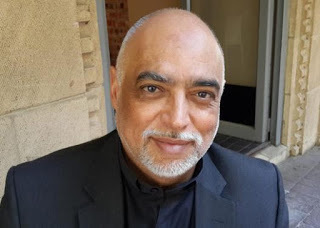
Here's Michael���s story. Called ���White Beaches��� it is about his youth in Cape Town:They laughed their way along the winding roads through the Gardens, Tamboerskloof ...up towards the mountain way before the sun had touched their homes on the flats."Hello uncle." someone would always shout to a white man behind a fence. A smile or a languid wave of the hand in acknowledgement, if not an acceptance of familial ties then to indicate, ���You don���t scare me, chaps.������Why do you call the vark (pig) ���uncle���?��� Sammy once asked of his younger cousin, George. The reply was quick in coming, ���Because I see him visit your mother when your toppie���s (father) at work.���Sammy���s father was a Bedding Boy on the railways and his job took him out of town for long periods of time. When he was home he continued with the drinking that helped him deal with long nights through the Karoo. And the passengers. Their attitudes.That and blikseming (beating) his eldest son who he believed wasn���t his own. He knew he was wrong and that the boy was his, evident in his Maasbieke (Mozambican) complexion, flat nose and lopsided smile and his Barry White baritone. But the accusation helped him feel less guilty about his frustrated fists that kept Sammy at a cautious distance.Roger, the St Andrew���s Eureka Estate Church Lads Brigade captain, intervened before Sammy could reply with an open-handed klap to the head of his nemesis. Instead he responded with Option 2, a fervent ���J-j-j-ou m-ma se p...��� His stutter slowed him long enough for Roger���s sharp pinch on the back of his neck to curb the challenge of a thousand township fights.Over the years ���Hello uncle��� was replaced with a good-natured, ���Look ma��� nice after the house. I am moving in when the revolution comes.���Sammy, George and Ivan were sitting at Breakfast Rock. It was 11���0���clock and they had finished their padkos of boiled eggs, cream crackers and Kool-aid. Roger had joined the navy and was no longer moving with them. Ivan spoke about his cousin in Bonteheuwel. He had seen a laaitie (young boy), Christopher Truter die in front of him. "It was during the riots."George had once seen a dead man lying under a bush at the Hoene��� Kamp near Balvenie Avenue. ���He was very light. The Diener just held his legs together by the knees. With one hand.���The sun was hot on their back as they looked towards the white sand of the beach in the distance.���My broer (brother), if you swim in a straight line for five days you���ll get to Brazil.��� Sammy was looking towards the blue water of Camps Bay when he offered this bit of travel news. ���That whole country is just full of coloureds just like us.��� Roger had told him this at the church Youth Club. ���And the gooste (girls), my broer, don���t even wear bikinis. Just a piecie string called a tanga.������You are blind stupid, you know?��� Challenged George. He was still naar about Sammy���s intended attack on his mother���s honour.���The sharks will vreet (eat) you like kaaiangs and you can���t even swim!���He started moving away as Sammy stood up finally completing the sentence that Roger had stopped a few years ago.���Ja man, and in Brazil there are only Brazilians. We coloureds are not made anywhere else.��� Ivan joined him, ���We are one hundred per cent Bushies, jou nwata!��� He shouted and started running across Pipe Track and down the side of the mountain.They kept running towards the beach. The cool breeze coming off the sea spurring them on. They realised that hardly had they stumbled and jumped over boulders and shrubs for more than 10 minutes that they were no longer on the mountain but running onto private property. They ran angry onto the white beach.
Michael ���s comment at the end of his Facebook post was: ���The memories, laughter always to mask the pain of our savage rejection. Will this injustice to us ever leave us? I doubt it!���
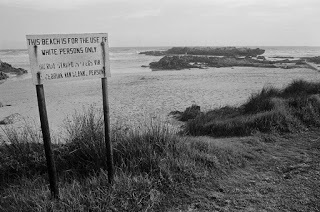
I wanted to post back, ���I feel your pain.��� But that would have been a lie. I���d never experienced the rejection of those young boys. Those beaches were always mine to use and they now call out to me in their windswept beauty to remind that there are still too many youngsters who feel unwelcome on too many beaches.
Our communities and even our Anglican parishes are planets apart ��� pockets of misunderstood pain.
I know a ���coloured��� parish that is making the priest���s life hell because she is a woman and black. I know a black parish that resents having a priest of any other colour celebrate the Eucharist. I know a white parish that resists the smallest ���Africanisation��� of liturgy with the determination of last defenders of European colonialism.
I also know that our country is riddled with the cancer of subliminal racism and I���m hungry for the passion that once fuelled all our hopes for the future.
South Africans are allowing the rainbow dream to slip away and I believe we in Church are called to prophetic ministry along with our Archbishop Thabo and other faith leaders who are speaking out.
Because I stopped listening with my heart and I forgot a black friend���s recollection of our first democratic election back in ���94:���For me, going to the voting booth was like going to a very private chapel. There was elements of great joy of knowing that this is a victory, this is a burial of something very evil, and that was my joy and my private satisfaction. What was also an element of great sadness was knowing that I was doing something which my father couldn't do. He couldn't vote...he couldn't exercise the very basic right. Knowing that there were so many of our people who had gone on beyond without tasting, without savouring this simple thing, I think I'll always carry that.���
Too many of us have forgotten the privilege of our vote and the cruelty of apartheid. Unless we share our stories we will never close the divide. And it���s not just about black or coloured pain.
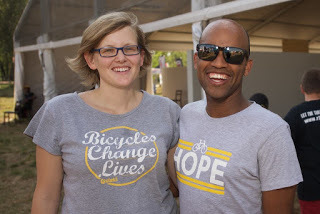 Wendy and Xylon van EyckIn her devotional blog Wendy van Eyck, a white woman married to a black man, tells of how differently they are treated because of the colour of their skins ��� how a second-hand book store accepts books from her but not her husband. She also reveals the pain a white mother when her darker skinned children are rejected socially ��� how white women who inter-marry lose their ���whiteness��� within their own communities.
Wendy and Xylon van EyckIn her devotional blog Wendy van Eyck, a white woman married to a black man, tells of how differently they are treated because of the colour of their skins ��� how a second-hand book store accepts books from her but not her husband. She also reveals the pain a white mother when her darker skinned children are rejected socially ��� how white women who inter-marry lose their ���whiteness��� within their own communities.When last did you hear a sermon on racism? Is it addressed in our Confirmation syllabus? Do we fuel it in conversations our children overhear? Do we underpin it with indifference about our neighbours?
How do you think we can make a difference?
Published on February 05, 2017 04:33
I’M GIVING UP TRUMP FOR LENT
I'd spent hours glued to CNN and BBC, watching the unfolding saga of Donald Trump's first 100 days as America's newest President. As a political and news junky I was overdosing on talking heads. Half in jest I posted on Facebook: "I'm seriously considering giving up Donald Trump for Lent."
The response was great: 140 likes/loves, four shares and 26 comments. Oh, and I zapped a Facebook 'friend' who loves The Donald and called me an ugly old witch.

All light relief from the right-wing bigotry of a tweeting billionaire with a false tan and funny hair who looks set to hurtle us into World War 3. I was on a roll – until I received an invitation to lead a quiet morning for our diocese. What a wake-up call! Initially, I was gobsmacked. You see, I’m not a quiet priest and I’m far from holy. So, I told my caller I’d think about it and let her know the following day.
I had a ready excuse: “Thanks, but I’m too busy”.
Now, unlike so many other good Anglicans, I’ve never had God or Jesus or the Holy Spirit speak directly to me but occasionally I get a spiritual zap that stops me in my tracks.
I pondered the Diocesan invitation. If I did accept what would the theme be? Where am I spiritually? What right do I have to guide people, who unlike me, are not “too busy” to devote quiet space to God?
I prayed. Not a Tweet from heaven. But the vitriolic response from the Trump fan I’d de-friended kept rattling. It was like a stubborn tune that becomes an unsolicited soundtrack and it signalled that I’d reacted exactly as Trump would have. I’m wielding social media as a weapon.
Then it hit me, I’d lost the plot – too quick to demonise and dehumanise.
In the frenzy of interacting with some 4000 Facebook and 5000 Twitter followers I was so busy being smart-assed I had shelved God in cyberspace.
I did accept the invitation to participate in the quiet morning and I knew that my role was not to lead but to facilitate a mutual spiritual journey. I prayed some more. Still no Tweet from heaven. I did, however, receive Greg Goebel’s blog. He pointed out that, although we priests are supposed to be politically non-partisan, the Gospel does need to be proclaimed in every aspect of human life. This includes politics, social conflict, and institutions.
I quote, “Being non-partisan doesn’t mean that we should avoid politics or protests or social conflicts. It can’t mean that, because we are supposed to be there with the Gospel.”
Of course, so much depends on how one interprets the Gospel and we Christians are past masters at interpreting Scripture to justify our bigotry, racism and other uglies.
My personal saga continued.
I’d no sooner mulled over Greg’s blog when Michael Weeder, Dean of St George’s Cathedral in Cape Town, posted a story on Facebook. It is called “White Beaches”. It was his comment at the end of his post that made me realise how badly I needed to reset my spiritual compass. Instead of exclaiming about American politics I must refocus on the gospel imperative to love and serve my neighbour.
I am ashamed of letting my dream new South Africa slip away. Thousands of children are not in school; the #FeesMustFall crisis continues; unemployment is rife; At least 94 mentally ill patients died in Gauteng last year. I had even lost sight of how we are empowered by the Holy Spirit to make a difference – each in our own sphere of influence. How it begins with empathy, caring about and for others. Listening with our hearts. Using social media as a positive force. Stepping out of our comfort zones.

Here's Michael’s story. Called ‘White Beaches” it is about his youth in Cape Town:They laughed their way along the winding roads through the Gardens, Tamboerskloof ...up towards the mountain way before the sun had touched their homes on the flats."Hello uncle." someone would always shout to a white man behind a fence. A smile or a languid wave of the hand in acknowledgement, if not an acceptance of familial ties then to indicate, “You don’t scare me, chaps.”“Why do you call the vark (pig) ‘uncle’?” Sammy once asked of his younger cousin, George. The reply was quick in coming, “Because I see him visit your mother when your toppie’s (father) at work.”Sammy’s father was a Bedding Boy on the railways and his job took him out of town for long periods of time. When he was home he continued with the drinking that helped him deal with long nights through the Karoo. And the passengers. Their attitudes.That and blikseming (beating) his eldest son who he believed wasn’t his own. He knew he was wrong and that the boy was his, evident in his Maasbieke (Mozambican) complexion, flat nose and lopsided smile and his Barry White baritone. But the accusation helped him feel less guilty about his frustrated fists that kept Sammy at a cautious distance.Roger, the St Andrew’s Eureka Estate Church Lads Brigade captain, intervened before Sammy could reply with an open-handed klap to the head of his nemesis. Instead he responded with Option 2, a fervent “J-j-j-ou m-ma se p...” His stutter slowed him long enough for Roger’s sharp pinch on the back of his neck to curb the challenge of a thousand township fights.Over the years “Hello uncle” was replaced with a good-natured, “Look ma’ nice after the house. I am moving in when the revolution comes.”Sammy, George and Ivan were sitting at Breakfast Rock. It was 11’0’clock and they had finished their padkos of boiled eggs, cream crackers and Kool-aid. Roger had joined the navy and was no longer moving with them. Ivan spoke about his cousin in Bonteheuwel. He had seen a laaitie (young boy), Christopher Truter die in front of him. "It was during the riots."George had once seen a dead man lying under a bush at the Hoene’ Kamp near Balvenie Avenue. “He was very light. The Diener just held his legs together by the knees. With one hand.”The sun was hot on their back as they looked towards the white sand of the beach in the distance.“My broer (brother), if you swim in a straight line for five days you’ll get to Brazil.” Sammy was looking towards the blue water of Camps Bay when he offered this bit of travel news. “That whole country is just full of coloureds just like us.” Roger had told him this at the church Youth Club. “And the gooste (girls), my broer, don’t even wear bikinis. Just a piecie string called a tanga.”“You are blind stupid, you know?” Challenged George. He was still naar about Sammy’s intended attack on his mother’s honour.“The sharks will vreet (eat) you like kaaiangs and you can’t even swim!”He started moving away as Sammy stood up finally completing the sentence that Roger had stopped a few years ago.“Ja man, and in Brazil there are only Brazilians. We coloureds are not made anywhere else.” Ivan joined him, “We are one hundred per cent Bushies, jou nwata!” He shouted and started running across Pipe Track and down the side of the mountain.They kept running towards the beach. The cool breeze coming off the sea spurring them on. They realised that hardly had they stumbled and jumped over boulders and shrubs for more than 10 minutes that they were no longer on the mountain but running onto private property. They ran angry onto the white beach.
Michael ‘s comment at the end of his Facebook post was: “The memories, laughter always to mask the pain of our savage rejection. Will this injustice to us ever leave us? I doubt it!”

I wanted to post back, “I feel your pain.” But that would have been a lie. I’d never experienced the rejection of those young boys. Those beaches were always mine to use and they now call out to me in their windswept beauty to remind that there are still too many youngsters who feel unwelcome on too many beaches.
Our communities and even our Anglican parishes are planets apart – pockets of misunderstood pain.
I know a ‘coloured’ parish that is making the priest’s life hell because she is a woman and black. I know a black parish that resents having a priest of any other colour celebrate the Eucharist. I know a white parish that resists the smallest ‘Africanisation’ of liturgy with the determination of last defenders of European colonialism.
I also know that our country is riddled with the cancer of subliminal racism and I’m hungry for the passion that once fuelled all our hopes for the future.
South Africans are allowing the rainbow dream to slip away and I believe we in Church are called to prophetic ministry along with our Archbishop Thabo and other faith leaders who are speaking out.
Because I stopped listening with my heart and I forgot a black friend’s recollection of our first democratic election back in ’94:“For me, going to the voting booth was like going to a very private chapel. There was elements of great joy of knowing that this is a victory, this is a burial of something very evil, and that was my joy and my private satisfaction. What was also an element of great sadness was knowing that I was doing something which my father couldn't do. He couldn't vote...he couldn't exercise the very basic right. Knowing that there were so many of our people who had gone on beyond without tasting, without savouring this simple thing, I think I'll always carry that.”
Too many of us have forgotten the privilege of our vote and the cruelty of apartheid. Unless we share our stories we will never close the divide. And it’s not just about black or coloured pain.
 Wendy and Xylon van EyckIn her devotional blog Wendy van Eyck, a white woman married to a black man, tells of how differently they are treated because of the colour of their skins – how a second-hand book store accepts books from her but not her husband. She also reveals the pain a white mother when her darker skinned children are rejected socially – how white women who inter-marry lose their “whiteness” within their own communities.
Wendy and Xylon van EyckIn her devotional blog Wendy van Eyck, a white woman married to a black man, tells of how differently they are treated because of the colour of their skins – how a second-hand book store accepts books from her but not her husband. She also reveals the pain a white mother when her darker skinned children are rejected socially – how white women who inter-marry lose their “whiteness” within their own communities.When last did you hear a sermon on racism? Is it addressed in our Confirmation syllabus? Do we fuel it in conversations our children overhear? Do we underpin it with indifference about our neighbours?
How do you think we can make a difference?
Published on February 05, 2017 04:33
January 22, 2017
JESUS AND TRUMP - SPOT THE SIMILARITIES (or not)
The official Christmas message from the American Republican National Committee created a Twitter storm because many felt the party was trying to liken then President-elect Donald Trump with Jesus.
Here it is:
"Merry Christmas to all! Over two millennia ago, a new hope was born into the world, a saviour who would offer the promise of salvation to all mankind. Just as the three wise men did on that night, this Christmas heralds a time to celebrate the good news of a new king."
It was that reference to a ‘new king’ that got the Twitterati going - you be the judge.
One must, however, concede that there are similarities – two superb communicators, offering a counter-cultural solution, both with extensive geographic influence. Their messages impact on the world order and Trump's circle of advisors is reminiscent of the disciples.
They both qualify as natty dressers, Jesus with his seamless woven tunic fit for a high priest and The Donald in his tailored suits.
Not least, both were underestimated by the religious and political authorities of their times.
Okay, I’ll stop there and concede to diametrically opposite messages. Whereas Jesus championed the poor and the oppressed Trump has promised to strengthen an economic system that has the world's eight richest people having wealth equal to half of humanity combined.
Jesus preached inclusiveness and love for all, Trump’s worldview includes winning at all costs, world conquest and entrenched privilege.
I also doubt that Jesus was obsessed with the size of his crowds.
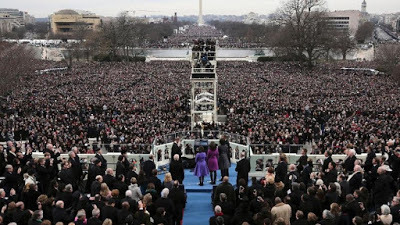 The Trump inauguration
The Trump inauguration (I must admit to trying to find a way to connect Trump’s proposed Mexican wall with Hadrian’s wall and then Jesus, but it was a stretch.)
(I must admit to trying to find a way to connect Trump’s proposed Mexican wall with Hadrian’s wall and then Jesus, but it was a stretch.) The eternal optimistAs President Donald Trump and other populist politicians gain traction across the western world, I find myself pinning hope on a young woman called Yael. That’s the name Ivanka Trump adopted when she converted to Orthodox Judaism and married Jared Kushner.
 Jared and Ivanka Kushner
Jared and Ivanka KushnerAlready pundits are predicting that she will be the most influential First Daughter in American history, a surrogate First Lady while her step-mother is in New York.
Although hers is officially an advisory role, she is known to blunt her father’s rough edges.
Moreover, her husband is The Donald’s senior White House advisor and often acts as a buffer between his father-in-law and the new people in his political life.
She is pivotal to two of the most powerful men in the world!
Having played a key role on the campaign trail, she attended her father's transition meetings which included the Japanese prime minister and technology leaders. And I find comfort in the theory that, if The Donald could do such a good job with his kids, he can’t be all bad.
For me it’s important that Ivanka and Jared are practicing Orthodox Jews. Observing the Sabbath, turning off cell phones and walking instead of driving between sundown Friday and sundown Saturday. Having to get rabbinic permission to travel by car on her father’s inauguration day.
It’s also important that her husband is the grandson of holocaust survivors who spent three and a half years in an Italian 'displaced–persons' camp while waiting for a US visa. Her in-laws speak of having had “nowhere to go”.
Moreover, she has experienced religious exclusion. When Jared’s family objected to her not being Jewish their relationship broke up in 2008.
I particularly like that, despite her high-powered business schedule, she tries to be with her children for breakfast and to put them to bed. She is also interested in working on policy issues related to children.
Some even argue that she has a bipartisan streak. They point to a close friendship with Chelsea Clinton. (Although I’m not sure how that stood up to the strain of the vitriolic presidential campaign.) Seems their husbands are also friends.

Do I hear mutterings of rose tinted glasses?
Yes, we optimists tend to dig deep for our hope. Just think back on how disparaging folk were about Joe Biden when Barack Obama picked him for a running mate and look how he turned out.
I am encouraged that Ivanka is intelligent, highly successful and loyal to America’s new president. It means he is likely to take her advice. I am mindful too that western democracy was borne on the wings of a Judeo/Christian moral humanitarianism.
And, as I watch ‘women’ marches in cities across the world I’m depending on Ivanka aka Jael to get daddy to understand an African maxim:

“When you strike a woman you strike a rock.”
Not confusing religion with GodDespite the ungodly South African hour, I watched the inaugural balls that at times seemed more like religious revival services. The prayers, gospel singers and black entertainers all spoke to good political marketing. It’s called “wooing the religious right” and reminds one never to confuse religion or politics with God.
Trump, who recently dropped money into a communion plate he thought was for the collection, grew up in a church-going Presbyterian family. This past Christmas Eve he and Melania attended midnight Mass at the church they were married in – the Episcopal Church of Bethesda-by-the-Sea in Palm Beach, Florida.

You could tell they weren’t dyed-in-the-wool Anglicans because they opted for the third pew from the front instead of squeezing into a back row. (I believe they received hearty applause and a standing ovation from the congregation.)

For security reasons, the rector would have had prior notification of the Trump’s visit so I find his gentle sermon particularly interesting. The Rev. James Harlan encouraged the congregation to let the little things go, saying, “All of us have some hurts, some resentments, some fears, some ways that someone has hurt us or offended us in the past that we won’t let go of. We kind of like it. I have those.
“We won’t let go of those things and I can tell you over time those little hurts, those little slights, those little things, consume us and they will push out that space for God’s love all too easily.”
The Trumps accepted Communion and there was no irate tweet in the middle of the night.
Pulpit powerThat social media respite was short-lived but the Christmas Eve homily was a gentle reminder of overdue pulpit power. Thankfully that sleeping giant is being shaken awake by recent world events.
In South Africa, President Jacob Zuma is likening himself to Jesus. (He says he has also been betrayed by people close to him and his mantra is that the ANC will rule until Jesus returns.)
Trump appears to be obsessed with size (hands, crowds, NATO contributions and media column inches.)
Europe is in a tizz over Brexit and right wing parties are fast gaining political support.
Good newsThankfully, religious leaders are mobilising but the battle is having to be fought on two fronts – against the powers that need to be checked as well as folk who believe Church should stay out of the political arena.
So, when President Zuma’s warned Archbishop Thabo Makgoba to stay out of politics and pray instead, the churchman used the power of the pulpit in his midnight mass sermon at St George’s Cathedral:

"It feels as if we are back to the national pain of 1963, living under a state of emergency, imposed on us by careless and corrupt leaders who have forgotten us, stripped us of our dignity, "
"People of faith need to begin asking: at what stage do we, as churches, as mosques, as synagogues, withdraw our moral support for a democratically-elected government?"
Makgoba also asked: "When do we name the gluttony, the inability to control the pursuit of excess? When do we name the fraudsters, who are unable to control their insatiable appetite for obscene wealth, accumulated at the expense of the poorest of the poor?
"A president of a democratic South Africa telling the church to stay out of politics? You would be forgiven for thinking that you had climbed into a time machine and gone back 30 years into the past when apartheid presidents said the same thing…
"Mr President, we will ignore your call, made from the palaces of power where you and your fellow leaders live in comfort. We will lament and ask God, 'Where are you, God, when your people are marginalised and excluded?"
The Archbishop of Canterbury has publicly supported Makgoba but the Church challenge is not confined to us Anglicans. Other denominations and faiths are rallying.
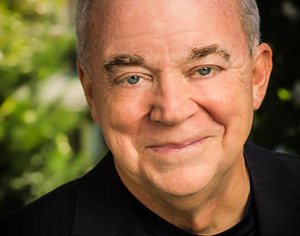
For example, the evangelical Jim Wallis, president of Sojourners, a Christian social justice organisation, says in his latest blog: “Faith must stand up for itself, for its values, for its standards, and for its priorities.”
Wallis also says, “I believe at the heart of this election campaign was the deeply biblical, theological, and spiritual issue of how we treat ‘the other’. He suggests that faith communities, especially congregations at the local level, could become safe and sacred spaces for deeper conversations about race in our history and in our communities, today.
A bumpy ride Let’s face it, no politician welcomes Church criticism even our beloved President Nelson Mandela bristled when Archbishop Njongonkulu Ndungane called the government out for, among other things, failing to ensure that old-age pensioners in the Eastern Cape got their money.
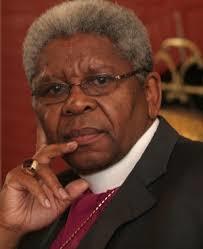 He’d warned, “Madiba magic won’t be solving our problems.”
He’d warned, “Madiba magic won’t be solving our problems.”A furious Madiba accused the archbishop of being ill-informed and of trying to undermine his government. The dispute raged as a presidential spokesperson suggested that the archbishop was seeking publicity and Ndungane declared that “no one will silence the Church.”
Asked what sort of relationship the Anglican Church ought to have with the government, Ndungane spoke of his ‘dual citizenship’ – South African and the Kingdom of Heaven.
“One seeks through the grace of God to be able to discern what to say. What we say will not always be popular. But we try under God to discern what is His mind and His will for a country at a particular time.”
In short, our benchmark is what fulfills justice by God’s standards. Speaking out is a gospel imperative.
Keep smiling

Published on January 22, 2017 10:06
January 9, 2017
WORLD NEEDS PRIESTS FIT FOR PURPOSE
Billy Willson, straight A student at Kansas State University, has announced on Facebook that his first semester would be his last. His comment, which went viral, was “YOU ARE BEING SCAMMED. You may not see it today or tomorrow, but you will see it someday. You are being put thousands into debt to learn things you will never even use. Wasting 4 years of your life to be stuck at a paycheck that grows slower than the rate of inflation. Paying $200 for a $6 textbook."
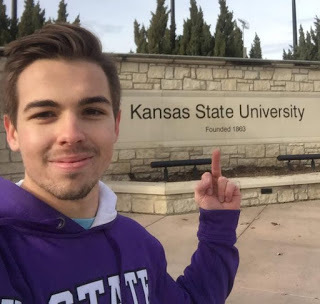 Billy Willson
Billy Willson
The Architectural Engineering under grad’s post struck a global chord. Many young adults are wondering if higher education is worth the time and money. As Billy pointed out in a BBC Trending interview, the cost of inflation is relatively small compared to fees inflation over the past three decades.
He has a point.
The average annual increase in university tuition in the UK grew by 260% between 1980-2014. Compare this to the cost of consumer items which grew at about 120% in that period. (And that was bad enough)
Even worse, worldwide graduates are finding that their hard-earned degrees are not an open sesame to their desired careers. Trey Foshee, one of many who commented on Billy’s Facebook post, wrote: "Years and money wasted. Very much agree. I have two degrees that I would sell back right now if they'd let me." Others mentioned professions that would be better served with on the job training.
Last year a UK education NGO reported that most graduates are employed in jobs unrelated to their degrees. Hopefully, few are in the same situation as the 35-year-old who graduated in 2010 with a master's in town planning and transport but works in a pub.
Our South African can of worms, opened by the #FeesMustFall movement, raises several issues. The new generation of students want, among other things, a ‘decolonialised’ education, lecturers who treat them with respect and fit for purpose content.
It’s time for a paradigm shift. Do the older folk who control tertiary education have the courage to acknowledge the sheer snobbery of a system that panders to the privileged by offering unaffordable education that does not prepare students for the workplace?
Conceived in ChurchSo, what has all this to do with Church? A great deal, if one considers that universities were conceived and developed in 814 when Charlemagne realised he needed educated people to ensure the survival of his empire.
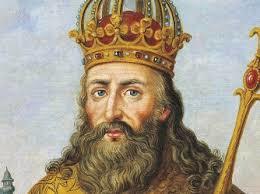 Charlemagne
Charlemagne
Every monastery and cathedral was commanded to provide free education to every boy who had the intelligence and perseverance to complete a course. Key to all this was to develop a large body of educated priests to whom the empire and communities could turn. The focus was on Latin grammar, public speaking, arithmetic, geometry, astronomy, and music.
Arithmetic, for example, was the basis for quantitative reasoning; geometry for architecture, surveying, and calculating measurements. All necessary for managing Church property and income. Astronomy was needed for calculating Easter, foretelling eclipses, and identifying the seasons.
By the second century, the church universities had expanded their curricula to develop secular leaders. For example, the cathedral school of Reims introduced Arabic numerical notation and the use of the abacus for numerical calculation. The Cathedral of Orleans specialised in classical studies, Chartres focused on the mathematical theory of music and the Norman monastery of Anselm, became known throughout northern Europe for the teaching of Law.
Birthed in a tavern Before I get on my soap box I must share a delightful story which showcases the birth of the modern university and the importance of faculty and students speaking truth to power. It is told by Dr Lynn Harry Nelson, Emeritus Professor of Medieval History at Kansas University.
She writes:One day in the Autumn of 1200, a German student decided to throw a bit of a party in his apartment for some of his friends and sent his servant, a ten-year-old boy, down to the corner tavern to get his large wine-jug filled.
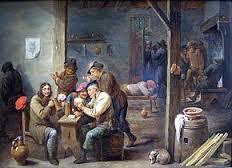
The tavern owner gave the boy sour wine and, when the boy complained, the bartender and some of the barflies beat the kid up and threw him out into the street along with his broken jug.
Why? I don't know. Perhaps it was because the German emperor had stirred up the English to start a long and bloody war with France. Or maybe it was because the barkeep liked the students' money, but not the students.
In any event, the boy dragged himself back to his master, and the student and his friends went down to the tavern and beat up everybody before they went home with a large jugful of decent wine. The barkeep asked the provost to punish the students, and the provost gathered his men, with volunteers, and blocked all the streets into the Latin Quarter. They then went hunting for the German student, slapping people around as they went. A number of masters and students were irritated by this, took to the streets, and a pitched battle ensued. The provost and his men finally withdrew, but not before they had killed five students, including the German student who had started it all, and who happened to have been the prince-bishop elect of Liege (in what is now Belgium).
The chancellor refused to help the master and students of the Latin Quarter, so they barricaded the streets leading into the Latin Quarter, and the masters held a meeting that night. They decided to organize themselves into a union, or, as it was called in the Latin of the time, a universitas. Since their students were studying to become masters themselves, the union included the students as more or less junior members. The next day, representatives of the union went to the king of France and announced themselves as spokesmen for The University of the Masters and Students of Paris.
They demanded corporate rights, privileges and protection from the king. When the king asked what they would do if he decided to say no, they replied with the famous words, "Then we shall shake the dust of the streets of Paris from the hems of our gowns."

In effect, they were threatening to leave and to do their teaching elsewhere. King Philip realized that Paris would lose much of its attractiveness and he would lose a considerable amount of taxes if the masters, students and the people who provided services to the Latin Quarter were to leave, and so agreed to protect the members of the Universitas.
Much more happened in succeeding years. There were continuing struggles with the chancellor and provost, and even among the students and masters themselves, but in the end, the union of masters and students was recognized by all. They gained powers -- the right to establish the curriculum, the requirements, and the standards of accomplishment; the right to debate any subject and uphold in debate any subject; the right to choose their own members; protection from local police; the right of each member to keep his license to teach as soon as he had been admitted to full membership; and others. These rights were often won in open battles in which people -- masters and students -- died, but they were rights that faculty still guard jealously today.
Church wherefore art thou?As we ponder a changing world order, faculty and students don’t appear to be that close anymore and how does Church rate in all this?
Thabo Makgoba Archbishop of Cape Town says “In times such as these, we need theologically trained leaders who will, in turn, encourage everyone in the church - clergy and lay people - to be theologically attuned,” he also told a recent synod that sound theological training provides essential grounding for the Church to face the challenges of today’s world.
The good news is that he fits the bill.
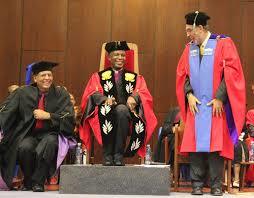
He has a BSc, a BA (Hons) in Applied Psychology and a Masters in Educational Psychology from Wits University as well as a Ph.D. on Spirituality in the South African Mining Workplace. Both a lecturer and chaplain at Wits he also served as Chancellor of the University of the Western Cape. And he gets street cred for having a son who was arrested for being involved in the recent student demos.
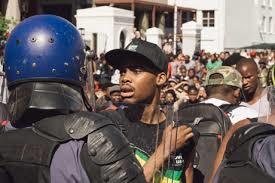 Nyakallo Makgoba
Nyakallo Makgoba
Our archbishop's dream for 2017 is “that labour and business, together with civil society, traditional leaders and religious leaders will all sit together at the table of brother and sisterhood where the menu answers the question, “what is in the best interests of the majority of our people in South African society?” And that all children, yours and mine, will one day, as a result of a “New Struggle”, all live in a South Africa that has an abundance of unlimited and equal educational, health care, service delivery and economic opportunities.”
Archbishop Thabo has also strongly rejected a call by President Jacob Zuma for the Church to stay out of politics.
Just what I expect of my archbishop. BUT where is the rest of Church in this? How good/relevant/ for purpose is the theological teaching provided from the pulpit? Is Sunday School a good ethical foundation? Does anyone bother to tell our Confirmation candidates that a 10-minute kiss makes you crossed-eyed and causes your brain to fall out of your ears? (A survey taken among Confirmation candidates about 15 years ago revealed that many had their first sexual experiences at 12 years of age. The majority confirmands were not virgins.)
How many of our clergy, including those from privileged backgrounds, consider a diploma in Theology good enough to equip them to equip the people in the pews. How much training have they had in balancing reason with tradition and Scripture? As importantly, how many read a daily newspaper, follow politics or keep up to date with scientific findings on human sexuality? Do they study developing theologies?
Just asking because I’m convinced bad theology has much to answer for as the talking heads on TV declare that we have entered a new world order. Only bad theology allows us to judge and hate those who are different. It’s bad theology to turn our backs on the marginalised.
I know it’s not easy preaching about unpopular subjects - congregations vote with their feet and their tithes. But we can’t abrogate our responsibility to archbishops and the Holy Spirit.Charlemagne was right: We need our priests to survive the emerging world order.
Aw shucks!
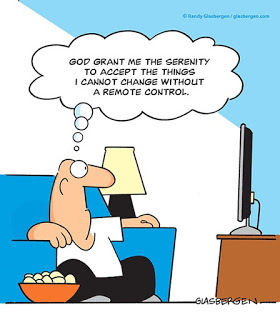
 Billy Willson
Billy WillsonThe Architectural Engineering under grad’s post struck a global chord. Many young adults are wondering if higher education is worth the time and money. As Billy pointed out in a BBC Trending interview, the cost of inflation is relatively small compared to fees inflation over the past three decades.
He has a point.
The average annual increase in university tuition in the UK grew by 260% between 1980-2014. Compare this to the cost of consumer items which grew at about 120% in that period. (And that was bad enough)
Even worse, worldwide graduates are finding that their hard-earned degrees are not an open sesame to their desired careers. Trey Foshee, one of many who commented on Billy’s Facebook post, wrote: "Years and money wasted. Very much agree. I have two degrees that I would sell back right now if they'd let me." Others mentioned professions that would be better served with on the job training.
Last year a UK education NGO reported that most graduates are employed in jobs unrelated to their degrees. Hopefully, few are in the same situation as the 35-year-old who graduated in 2010 with a master's in town planning and transport but works in a pub.
Our South African can of worms, opened by the #FeesMustFall movement, raises several issues. The new generation of students want, among other things, a ‘decolonialised’ education, lecturers who treat them with respect and fit for purpose content.
It’s time for a paradigm shift. Do the older folk who control tertiary education have the courage to acknowledge the sheer snobbery of a system that panders to the privileged by offering unaffordable education that does not prepare students for the workplace?
Conceived in ChurchSo, what has all this to do with Church? A great deal, if one considers that universities were conceived and developed in 814 when Charlemagne realised he needed educated people to ensure the survival of his empire.
 Charlemagne
CharlemagneEvery monastery and cathedral was commanded to provide free education to every boy who had the intelligence and perseverance to complete a course. Key to all this was to develop a large body of educated priests to whom the empire and communities could turn. The focus was on Latin grammar, public speaking, arithmetic, geometry, astronomy, and music.
Arithmetic, for example, was the basis for quantitative reasoning; geometry for architecture, surveying, and calculating measurements. All necessary for managing Church property and income. Astronomy was needed for calculating Easter, foretelling eclipses, and identifying the seasons.
By the second century, the church universities had expanded their curricula to develop secular leaders. For example, the cathedral school of Reims introduced Arabic numerical notation and the use of the abacus for numerical calculation. The Cathedral of Orleans specialised in classical studies, Chartres focused on the mathematical theory of music and the Norman monastery of Anselm, became known throughout northern Europe for the teaching of Law.
Birthed in a tavern Before I get on my soap box I must share a delightful story which showcases the birth of the modern university and the importance of faculty and students speaking truth to power. It is told by Dr Lynn Harry Nelson, Emeritus Professor of Medieval History at Kansas University.
She writes:One day in the Autumn of 1200, a German student decided to throw a bit of a party in his apartment for some of his friends and sent his servant, a ten-year-old boy, down to the corner tavern to get his large wine-jug filled.

The tavern owner gave the boy sour wine and, when the boy complained, the bartender and some of the barflies beat the kid up and threw him out into the street along with his broken jug.
Why? I don't know. Perhaps it was because the German emperor had stirred up the English to start a long and bloody war with France. Or maybe it was because the barkeep liked the students' money, but not the students.
In any event, the boy dragged himself back to his master, and the student and his friends went down to the tavern and beat up everybody before they went home with a large jugful of decent wine. The barkeep asked the provost to punish the students, and the provost gathered his men, with volunteers, and blocked all the streets into the Latin Quarter. They then went hunting for the German student, slapping people around as they went. A number of masters and students were irritated by this, took to the streets, and a pitched battle ensued. The provost and his men finally withdrew, but not before they had killed five students, including the German student who had started it all, and who happened to have been the prince-bishop elect of Liege (in what is now Belgium).
The chancellor refused to help the master and students of the Latin Quarter, so they barricaded the streets leading into the Latin Quarter, and the masters held a meeting that night. They decided to organize themselves into a union, or, as it was called in the Latin of the time, a universitas. Since their students were studying to become masters themselves, the union included the students as more or less junior members. The next day, representatives of the union went to the king of France and announced themselves as spokesmen for The University of the Masters and Students of Paris.
They demanded corporate rights, privileges and protection from the king. When the king asked what they would do if he decided to say no, they replied with the famous words, "Then we shall shake the dust of the streets of Paris from the hems of our gowns."

In effect, they were threatening to leave and to do their teaching elsewhere. King Philip realized that Paris would lose much of its attractiveness and he would lose a considerable amount of taxes if the masters, students and the people who provided services to the Latin Quarter were to leave, and so agreed to protect the members of the Universitas.
Much more happened in succeeding years. There were continuing struggles with the chancellor and provost, and even among the students and masters themselves, but in the end, the union of masters and students was recognized by all. They gained powers -- the right to establish the curriculum, the requirements, and the standards of accomplishment; the right to debate any subject and uphold in debate any subject; the right to choose their own members; protection from local police; the right of each member to keep his license to teach as soon as he had been admitted to full membership; and others. These rights were often won in open battles in which people -- masters and students -- died, but they were rights that faculty still guard jealously today.
Church wherefore art thou?As we ponder a changing world order, faculty and students don’t appear to be that close anymore and how does Church rate in all this?
Thabo Makgoba Archbishop of Cape Town says “In times such as these, we need theologically trained leaders who will, in turn, encourage everyone in the church - clergy and lay people - to be theologically attuned,” he also told a recent synod that sound theological training provides essential grounding for the Church to face the challenges of today’s world.
The good news is that he fits the bill.

He has a BSc, a BA (Hons) in Applied Psychology and a Masters in Educational Psychology from Wits University as well as a Ph.D. on Spirituality in the South African Mining Workplace. Both a lecturer and chaplain at Wits he also served as Chancellor of the University of the Western Cape. And he gets street cred for having a son who was arrested for being involved in the recent student demos.
 Nyakallo Makgoba
Nyakallo MakgobaOur archbishop's dream for 2017 is “that labour and business, together with civil society, traditional leaders and religious leaders will all sit together at the table of brother and sisterhood where the menu answers the question, “what is in the best interests of the majority of our people in South African society?” And that all children, yours and mine, will one day, as a result of a “New Struggle”, all live in a South Africa that has an abundance of unlimited and equal educational, health care, service delivery and economic opportunities.”
Archbishop Thabo has also strongly rejected a call by President Jacob Zuma for the Church to stay out of politics.
Just what I expect of my archbishop. BUT where is the rest of Church in this? How good/relevant/ for purpose is the theological teaching provided from the pulpit? Is Sunday School a good ethical foundation? Does anyone bother to tell our Confirmation candidates that a 10-minute kiss makes you crossed-eyed and causes your brain to fall out of your ears? (A survey taken among Confirmation candidates about 15 years ago revealed that many had their first sexual experiences at 12 years of age. The majority confirmands were not virgins.)
How many of our clergy, including those from privileged backgrounds, consider a diploma in Theology good enough to equip them to equip the people in the pews. How much training have they had in balancing reason with tradition and Scripture? As importantly, how many read a daily newspaper, follow politics or keep up to date with scientific findings on human sexuality? Do they study developing theologies?
Just asking because I’m convinced bad theology has much to answer for as the talking heads on TV declare that we have entered a new world order. Only bad theology allows us to judge and hate those who are different. It’s bad theology to turn our backs on the marginalised.
I know it’s not easy preaching about unpopular subjects - congregations vote with their feet and their tithes. But we can’t abrogate our responsibility to archbishops and the Holy Spirit.Charlemagne was right: We need our priests to survive the emerging world order.
Aw shucks!

Published on January 09, 2017 01:50
December 23, 2016
CHUCKING JESUS OUT WITH THE BATHWATER
I can’t for the life of me understand the fuss about: “Happy Holiday” greetings; the neutral Starbucks coffee mug designs; and halal turkeys. Our Christmas celebrations were always based on popular secular traditions. The early church melded Jesus' nativity celebration with pre-existing midwinter festivals and we should give those guys a gold star for pragmatism but, let's face it, along the line we've thrown the baby out with the bathwater.
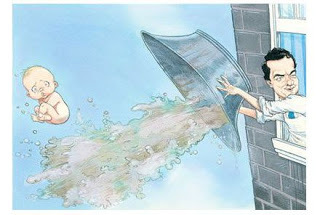
There’s good reason why our retail chains and big business have dared to remove Jesus from their displays. They claim not to want to discriminate against their “non-Christian” customers. But, it’s the majority who claim to be Christian in the national census that have chucked Jesus out of Christmas. We raise our children to believe it’s the season of wish lists and receiving – the opposite of what the Christ child was about.
How many 'Christian' homes include a nativity scene in their annual decorations? More importantly, how many preachers speak about Jesus and the Father being one? (Mind you, most avoid the tricky challenge of preaching about the Trinity at any time of the year.) Do we shirk from linking that cute baby who didn’t even have Pampers nappies with God? Or is he only presented as a cute boy who grew up to do great party tricks? (Water into wine is my favourite.)
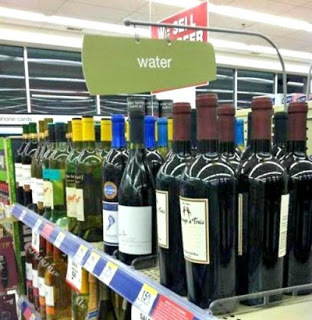
It’s such fun celebrating a manageable baby that we pack away by New Year’s Eve. And, because we largely ignore the next three decades of his life, we ignore God manifesting God to us in that part of Jesus’ life. Surely there must have been a good reason for Jesus to start from the womb? Or he could simply have skipped the potty training and other learning hurdles to arrive in time for the Wedding of Cana. Instead, we have a westernised instant Jesus pop up at around the age of 30. and we’ve even changed his skin tone.
As a former PR practitioner, I’ve always been impressed with God’s good marketing sense in that Jesus, the child of Middle Eastern Jews, was neither white nor black. Then along came our colonialist missionaries who did a superb job of “selling” a lily-white Jesus to the heathens. Check out the pale pink doll in the nativity scene.
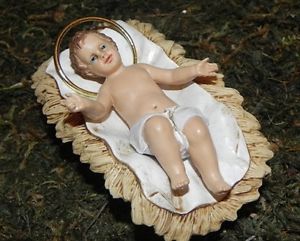
No wonder so many children grow up convinced that God is white.
It gets worse I’ve attended a couple of nativity plays this year and was twice hugely entertained when a fairy tale was incorporated. However, as I write this I am having to tell myself: “STOP IT” – once again we are allowing Jesus, who should be central to the story, to be usurped. When the grand finale is Cinderella marrying the prince, the little pink doll and the rest of the cast are a mere backdrop to a concert. Don’t blame the Sunday School kids if they grow up thinking the Jesus story is a fairy tale.
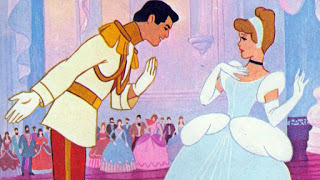
And worse stillDespite the emphasis on content marketing, Church fails dismally in nurturing human interest about the boy Jesus. Having packed the baby away with the Christmas decorations we suddenly haul out the grown man and hurtle towards Lent, the crucifixion, and Easter.
I know, I know, we are essentially resurrection folk but surely the people in the pews would find it easier to develop a spiritual relationship with Jesus if there was greater understanding that he was fully human. He was once a teenager and experienced all that entails physically and emotionally. An added complication was having to grow up in a village in which history indicates the village gossips had labelled him the bastard son of a Roman soldier.
Church even sells his parents short.
Who could possibly appreciate the bravery of a teenage girl and her fiancé if we don’t offer in-depth teaching on an honour driven culture. One in which a girl rape victim is killed for disgracing her family and in which Joseph would have lost honour (his most valuable asset) for marrying the pregnant Mary.
How did the boy Jesus cope? How did his siblings react? We do know they weren't all that impressed with his public ministry. As John's gospel reveals: "Even his brothers did not believe him." There's no mention of sisters but in that culture their opinions were worthless. (To understand that is to better understand the counter cultural significance of the adult Jesus' attitude to women.)
I grew up believing Jesus was an only child because there was never any mention of siblings by the Catholic nuns at my boarding schools. The implication being that Mother Mary never did anything as dirty as sex. (I used to feel sorry for Joseph on that score.)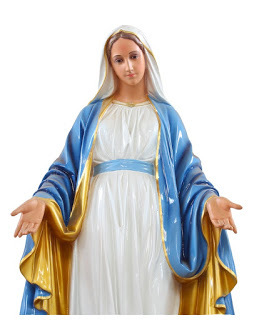 The Mary I grew up with
The Mary I grew up with
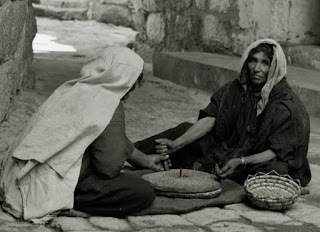 More likely?Methinks that the only way to make Jesus and Christianity relevant in a modern world is for our theologians and theological educators to apply empathy and develop a whole picture. We use intellectual and historical deduction in so many other arenas, why not with Jesus. That would make it so much easier to get Christians riled enough to make Jesus more important than the fat bearded man in a red tracksuit.
More likely?Methinks that the only way to make Jesus and Christianity relevant in a modern world is for our theologians and theological educators to apply empathy and develop a whole picture. We use intellectual and historical deduction in so many other arenas, why not with Jesus. That would make it so much easier to get Christians riled enough to make Jesus more important than the fat bearded man in a red tracksuit.
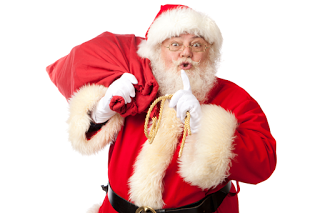
Okay, I’ll stop now
Let me share what Jim Wallis - New York Times bestselling author, public theologian, speaker and international commentator - says about his parish Christmas Carol concert which always ends with the Hallelujah Chorus:-
The kingdom of this world
Is become the Kingdom of our Lord
and of his Christ, and of his Christ;
and he shall reign for ever and ever ...
King of Kings, and Lord or Lords,
Forever and ever. Hallelujah!
Who is in charge? Who will reign? Not the would-be rulers who now think they are in charge or believe they soon will be. Not in God’s world. Not in the hearts of those who begin with God’s word and are reminded this Christmas of what the coming of Christ means.
When it came to the carol service’s triumphant ending with the Hallelujah Chorus, we all rose to our feet, as, legendarily, did English King George II when he first heard it and people have traditionally ever since. And when we proclaimed who will reign forever and ever at the top of our lungs, I felt like pumping my fist into the air this holiday season (but didn’t for fear of embarrassing my college son). I desperately need the hope that Christmas brings me every year, and still does; that the new order that this child brings to the world literally overturns the world of our politics today. And that hope allows me to sing out:Joy to the world, the Lord is come! Let earth receive her King;
Let every heart prepare him room…..
He rules the world with truth and grace
And makes the nations prove
The glories of his righteousness,
And wonders of his love.
I especially need my Christmas carols this year when darkness seems to be settling in on all sides, and faith will mean finding a little light in that darkness.For reasons that some of you can understand, I have also been drawn to German theologian and political resister Dietrich Bonhoeffer this Christmas season, and to the Christmas sermons he preached as darkness grew in his own country many years ago.Bonhoeffer said, “God is in the manger.”
...............................................
Thank you, Jim. Many of us are worried about the shift in our world order.
In lighter veinAs usual, our Anglican services were packed with families who love the Christmas tradition but don’t attend throughout the year.
I’m reminded of the preacher who drew once such person aside and said: “You need to join the army of the Lord!”To which the man replied: I am already in His army.”“How come I don’t see you except at Christmas and Easter?”
The man whispered back: "I'm in the Secret Service."
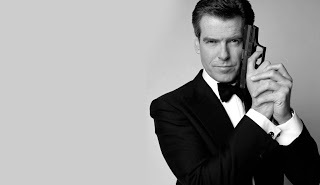
PS:
Any thoughts about what Jesus was like as a boy?

There’s good reason why our retail chains and big business have dared to remove Jesus from their displays. They claim not to want to discriminate against their “non-Christian” customers. But, it’s the majority who claim to be Christian in the national census that have chucked Jesus out of Christmas. We raise our children to believe it’s the season of wish lists and receiving – the opposite of what the Christ child was about.
How many 'Christian' homes include a nativity scene in their annual decorations? More importantly, how many preachers speak about Jesus and the Father being one? (Mind you, most avoid the tricky challenge of preaching about the Trinity at any time of the year.) Do we shirk from linking that cute baby who didn’t even have Pampers nappies with God? Or is he only presented as a cute boy who grew up to do great party tricks? (Water into wine is my favourite.)

It’s such fun celebrating a manageable baby that we pack away by New Year’s Eve. And, because we largely ignore the next three decades of his life, we ignore God manifesting God to us in that part of Jesus’ life. Surely there must have been a good reason for Jesus to start from the womb? Or he could simply have skipped the potty training and other learning hurdles to arrive in time for the Wedding of Cana. Instead, we have a westernised instant Jesus pop up at around the age of 30. and we’ve even changed his skin tone.
As a former PR practitioner, I’ve always been impressed with God’s good marketing sense in that Jesus, the child of Middle Eastern Jews, was neither white nor black. Then along came our colonialist missionaries who did a superb job of “selling” a lily-white Jesus to the heathens. Check out the pale pink doll in the nativity scene.

No wonder so many children grow up convinced that God is white.
It gets worse I’ve attended a couple of nativity plays this year and was twice hugely entertained when a fairy tale was incorporated. However, as I write this I am having to tell myself: “STOP IT” – once again we are allowing Jesus, who should be central to the story, to be usurped. When the grand finale is Cinderella marrying the prince, the little pink doll and the rest of the cast are a mere backdrop to a concert. Don’t blame the Sunday School kids if they grow up thinking the Jesus story is a fairy tale.

And worse stillDespite the emphasis on content marketing, Church fails dismally in nurturing human interest about the boy Jesus. Having packed the baby away with the Christmas decorations we suddenly haul out the grown man and hurtle towards Lent, the crucifixion, and Easter.
I know, I know, we are essentially resurrection folk but surely the people in the pews would find it easier to develop a spiritual relationship with Jesus if there was greater understanding that he was fully human. He was once a teenager and experienced all that entails physically and emotionally. An added complication was having to grow up in a village in which history indicates the village gossips had labelled him the bastard son of a Roman soldier.
Church even sells his parents short.
Who could possibly appreciate the bravery of a teenage girl and her fiancé if we don’t offer in-depth teaching on an honour driven culture. One in which a girl rape victim is killed for disgracing her family and in which Joseph would have lost honour (his most valuable asset) for marrying the pregnant Mary.
How did the boy Jesus cope? How did his siblings react? We do know they weren't all that impressed with his public ministry. As John's gospel reveals: "Even his brothers did not believe him." There's no mention of sisters but in that culture their opinions were worthless. (To understand that is to better understand the counter cultural significance of the adult Jesus' attitude to women.)
I grew up believing Jesus was an only child because there was never any mention of siblings by the Catholic nuns at my boarding schools. The implication being that Mother Mary never did anything as dirty as sex. (I used to feel sorry for Joseph on that score.)
 The Mary I grew up with
The Mary I grew up with More likely?Methinks that the only way to make Jesus and Christianity relevant in a modern world is for our theologians and theological educators to apply empathy and develop a whole picture. We use intellectual and historical deduction in so many other arenas, why not with Jesus. That would make it so much easier to get Christians riled enough to make Jesus more important than the fat bearded man in a red tracksuit.
More likely?Methinks that the only way to make Jesus and Christianity relevant in a modern world is for our theologians and theological educators to apply empathy and develop a whole picture. We use intellectual and historical deduction in so many other arenas, why not with Jesus. That would make it so much easier to get Christians riled enough to make Jesus more important than the fat bearded man in a red tracksuit.
Okay, I’ll stop now
Let me share what Jim Wallis - New York Times bestselling author, public theologian, speaker and international commentator - says about his parish Christmas Carol concert which always ends with the Hallelujah Chorus:-
The kingdom of this world
Is become the Kingdom of our Lord
and of his Christ, and of his Christ;
and he shall reign for ever and ever ...
King of Kings, and Lord or Lords,
Forever and ever. Hallelujah!
Who is in charge? Who will reign? Not the would-be rulers who now think they are in charge or believe they soon will be. Not in God’s world. Not in the hearts of those who begin with God’s word and are reminded this Christmas of what the coming of Christ means.
When it came to the carol service’s triumphant ending with the Hallelujah Chorus, we all rose to our feet, as, legendarily, did English King George II when he first heard it and people have traditionally ever since. And when we proclaimed who will reign forever and ever at the top of our lungs, I felt like pumping my fist into the air this holiday season (but didn’t for fear of embarrassing my college son). I desperately need the hope that Christmas brings me every year, and still does; that the new order that this child brings to the world literally overturns the world of our politics today. And that hope allows me to sing out:Joy to the world, the Lord is come! Let earth receive her King;
Let every heart prepare him room…..
He rules the world with truth and grace
And makes the nations prove
The glories of his righteousness,
And wonders of his love.
I especially need my Christmas carols this year when darkness seems to be settling in on all sides, and faith will mean finding a little light in that darkness.For reasons that some of you can understand, I have also been drawn to German theologian and political resister Dietrich Bonhoeffer this Christmas season, and to the Christmas sermons he preached as darkness grew in his own country many years ago.Bonhoeffer said, “God is in the manger.”
...............................................
Thank you, Jim. Many of us are worried about the shift in our world order.
In lighter veinAs usual, our Anglican services were packed with families who love the Christmas tradition but don’t attend throughout the year.
I’m reminded of the preacher who drew once such person aside and said: “You need to join the army of the Lord!”To which the man replied: I am already in His army.”“How come I don’t see you except at Christmas and Easter?”
The man whispered back: "I'm in the Secret Service."

PS:
Any thoughts about what Jesus was like as a boy?
Published on December 23, 2016 22:24
November 26, 2016
I HAD THE WEIRDEST DREAM
I believe we talk to ourselves in our dreams. I dream often, in technicolour, and they are invariably exhausting. But this one was different. Verging on weird, it touched my soul. Not gently.
One of the problems with being a political junkie is one often loses sight of life. Between the US Presidential primaries, #FeesMust Fall and #SaveSouthAfrica I’ve barely had time to breathe. For months, I was sleep deprived as my inner alarm sounded at 3am for crucial debates.
Oh, the analysis, the commentary, the social media skirmishes! My dreamThen, early this morning I dreamed I was in Israel being herded into a holding place with a large group of tourists - Muslims, Jews and Christians. There was some sort of invasion and we were in danger. At first we were fearful and then this narrator with a heavy accent took over. It was much like a Yentl movie with a talking ‘Fiddler on the roof’. (I kid you not.)
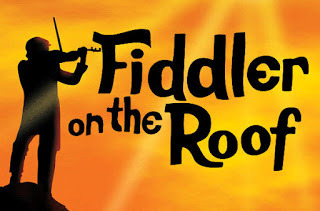
There was this, running commentary on the little miracles that were happening as we scrounged for and shared food and how we were learning to love each other in the process. Then I woke up but the heavily accented voice continued.
A deep-seated envyNow let me be upfront. Unlike so many others, I’ve never heard God’s voice. So often I’ve had someone share: “God told me.” Frankly, I’ve suffered serious ‘Godspeak envy’ over the years. And I’ve always wondered what God sounds like – authoritative, melodious, a choir of angels, Alanis Morrisette? (Anyone out there old enough to remember her playing God in Dogma?) Mind you, I was consoled when my former bishop shared that he’s also been deprived.
Because I’ve never had God speak directly to me, I’m sure you’ll forgive me for getting my hopes up. No such luck. I’d fallen asleep with BBC News on and Stephen Sackur was interviewing Lithuania’s heavily accented Foreign Minister. I usually pause to check if my dreams mean anything and then shrug them off. But this one persisted. So, I hit the TV rewind button, made a strong cup of coffee and watched Hardtalk with a listening heart.
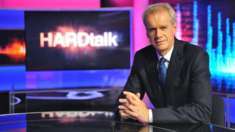
That didn’t help much. Essentially, Minister Linas Linkevicius spoke about: how populists were winning the day; how false news often precedes warfare. He was waiting to see how Donald Trump would react to reality and felt we should all make an effort to calm things down.
A demanding dreamIt was time to switch off and get on with life. But the feeling persisted. My dream still demanded attention. For the first time in months, I ignored work deadlines and took stock.
The result: my God connection is worse than my jittery Wi-Fi. What spirituality?? And the wheels must have fallen off the bus somewhere along my Anglican journey.
Fact is, all three have been sadly neglected. How easily one’s prayer life disintegrates. What arrogance to assume that my fragile spirituality would fare any better than my drought-stricken garden. I’ve hardly attended church in the past few months.
I can’t even pretend that it will simply be a matter of rearranging my daily schedule. I’m afraid of the battle ahead. I must resume my journey.
Well timedFor starters, I acknowledge that my weird dream was well timed and apt. Part of my new daily discipline is to count my blessings and today I am reminded of a time a couple of years ago when my income had totally dried up. Having acquired religion late in life, I’ve always felt uncomfortable about praying for money but it reached a point where I capitulated: “Okay God, I give up I’m desperate.” An hour later an email dropped to say I’d been awarded a fat government contract.
Co-incidence or God-incidence?
I know that when my younger son suffered a serious head injury in a motorcycle accident, although I wasn’t into religion at the time I did send arrow prayers tempered with “in case you exist God”.
The doctors said he’d be in a wheelchair for the rest of his life but don’t tell that to the guy who plays bowls three times a week and hopes to represent Western Province one day.
Please bear with me. You’ve probably guessed by now that I’m writing this blog to myself. Know that your comments and prayers are welcome.
Let’s lighten up.
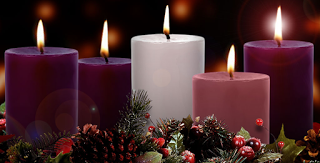
When I joined the church, well into middle age, I was amazed to learn that Advent –the weeks preceding Christmas - is meant to be a mini-Lent. It is a time to take stock and get our spiritual lives in order for the day we celebrate the birth of Christ. Who’d have thought that?
In fact, I’ve always admired the Early Church’s practical approach of adopting pagan rituals that dated thousands of years before Christ.
My own experience of Christmas had hardly been holy. My mother was one of 15 siblings, of which only one had died in childhood. All the rest had married and made children and Christmas on granny’s farm in Polokwane was not negotiable. I can’t for the life of me remember how many cousins there were but “lots” is an apt description. Some of us kids were sent ahead of our parents during which time I was only allowed to play with the boys if I walked barefooted across a patch of paper thorns.
By Christmas day we’d formed various special interest alliances. There was, however, consensus on important matters. These ranged from the need to avoid kissing the uncle with the beer soaked moustache to an agreement not to report the family cook for sipping the pudding brandy. We all loved her.
Of course, in that lot there was always the uncle with wandering hands but a whisper in Gran’s ear soon fixed that. In short, our special feast day was always robust and memorable with not a church steeple in sight.
When I did become an Anglican I was a bit embarrassed by my Christmas history but soon realised that in family there is always an element of holiness. Besides, the way we Christians hurtle through the shopping and party season there’s not much time for reflection. (Maybe my dream was a hefty Advent nudge.)
I am encouraged by an email received from our Archbishop of Cape Town, Thabo Makgoba, in which he says, “... I want to say that whatever the challenges or sense of darkness you may have felt or be feeling this year, know that Christ the hope and light of the world has been there illuming your path. As you work through Advent to the celebration of Christmas, may you, to borrow a phrase from Advent's sister season, Lent, “bury the past in ashes.” Remember that we are people of the Resurrection and are called to spread Christ, the hope of the world, this Christmas, Epiphany and beyond.”
By the way, he is placing a recorded advent message on https://soundcloud.com/anglicanmediasa each week until Christmas.
Now, where was I?
Oh yes, busy contemplating my spiritual navel. I’ll keep you posted.
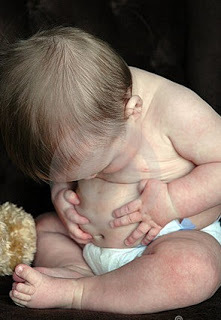
Published on November 26, 2016 21:57
November 22, 2016
WHAT DO THE POPE, TRUMP, ZUMA & JESUS HAVE IN COMMON?
Take a bow Fake News.
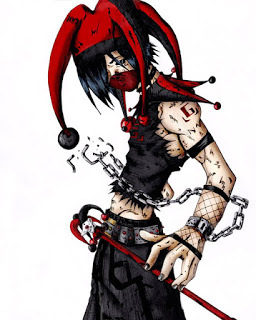
I know you’ve been around since that darned snake whispered in Eve’s ear and she passed the false info to her hubby, but you are now possibly more famous than the Kardashians.
Admittedly, when you consider the fake stories even cynical journalists have fallen for, social media has given you wings that an Archangel would give her halo for. As the Trump dust settles and the pundits analyse the USA presidential election to death, you have emerged as the villain of a bitter campaign that kicked sand in pollster and commentator faces alike.
A convenient scapegoatAmidst wails of “information warfare”, warnings that “the first casualty of war is truth” and talk of “the collapse of world order”, you Fake News are the perfect scapegoat.
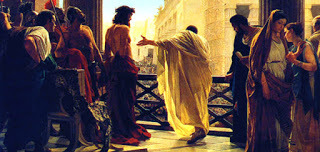
It’s frightfully biblical my dear, and we must not forget the clever role you played in Pilate’s condemnation of Jesus. The baying mob who influenced his decision was as misinformed as so many electorates are today.
A global phenomenonIn modern time your undue influence spreads well beyond the good old US of A.
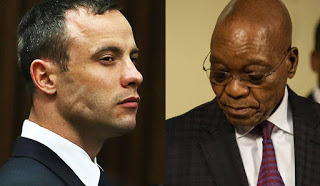
Take, for instance, your story about Jacob Zuma’s presidential pardon of Oscar Pistorius. It made headlines in respected newspapers across the world.
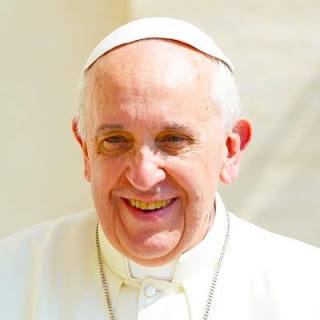
I can imagine your glee when you tricked the social media fraternity into believing that dear Pope Francis had endorsed The Donald. Then there’s the old, but often repeated, one about the pastor who is about to be crucified by Isis. We’ve gone through that dramatic countdown so many times I’m surprised Hollywood hasn’t made the movie. Who knows how many shares and amens it’s had on Facebook. All the while fueling anti-Islamic hysteria.
Feeling neglected?There is one arena where you haven’t attracted the attention you probably think you deserve – the Anglican Church. While pundits pontificate and Google and Facebook threaten to shut your bogus news accounts, I’m wondering how many sermons you have featured in? It seems that, along with other insidious sins like racism, gender violence and cyber bullying, you are seldom taught in a Confirmation class. Nor are the adults in our pews reminded of our Christian responsibility in all this.
Words of a conservativeI must give the Executive Director of the Billy Graham Center for Evangelism at Wheaton College, his due. Eighteen months ago, Dr Ed Stetzer wrote about an ‘Embarrassing Week for Christians Sharing Fake News’.
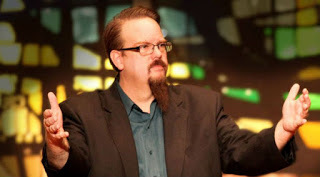 Dr Ed StetzerHis opening gambit was: “Don't believe everything you read on the Internet. You embarrass us all when you do.” He has even written a series called "Faux Christian Controversy of the Week". As he says, “it just keeps happening”.
Dr Ed StetzerHis opening gambit was: “Don't believe everything you read on the Internet. You embarrass us all when you do.” He has even written a series called "Faux Christian Controversy of the Week". As he says, “it just keeps happening”.Two “news” stories doing the rounds that week were: ‘Pastor Arrested for Refusing a Same-Sex Marriage’ and a report about a homosexual man who had filed a $70 million lawsuit against Bible publishers Zondervan and Thomas Nelson, alleging that their version of the Bible referred to homosexuality as a sin and violated his constitutional rights.
What to doEssentially, Ed Stetzer’s message is: Stop it! Importantly, he offers practical advice:
If something sounds crazy, check the URL. The lawsuit story was on NBC.com.co.Did you notice the extra .co on the end? That’s the giveaway. It’s a fake site. (I often Google the gist of the headline and add ‘Hoax? And http://www.snopes.com/, which features trending false stories, is a great help.)
Dr Setzer reminds that it’s OUR job—yes OURS—to check the facts. Our websites should do that as well, but most are more concerned with gaining page views than earning credibility.
He adds, “There are real issues about religious liberty right now. Posting links to fake ones just make all of us look gullible.” (By implication
So, if you realise you have posted a fake story, here are a few things you can do:1. Be humble and post a retraction. As he points out “Integrity is important for the Christian. The Scriptures are clear, especially in Proverbs 2:20-21 which says:So, follow the way of good people,
and keep to the paths of the righteous.
For the upright will inhabit the land,
and those of integrity will remain in it;
Later, Proverbs 28:18 says:The one who lives with integrity will be helped,
but one who distorts right and wrong
will suddenly fall.
We are duty bound to protect our friends from being tricked as we were.
2. Don’t excuse a falsehood by saying, “Well, it might be true.” Or, “Well, there is something like that." "Or, well, it will be true soon." Or even, “It should be true.”No, if you were wrong, say it and move on.
3. Be less gullible next time.Wisdom is valuable:Get wisdom—
how much better it is than gold!
And get understanding—
it is preferable to silver. (Prov 16:16)
"But," you may think, "I'm not wise. I get fooled by this stuff all the time." That's okay, Scripture accounts for people like us. James 1:5 says:“Now if any of you lacks wisdom, he should ask God, who gives to all generously and without criticizing, and it will be given to him.”, Thanksgiving
Finally, the Bible makes it clear: Lying is wrong. Don't lie, even if you don't mean to. And make it right if you do.
Thank-you Dr Ed.
Talking turkey:
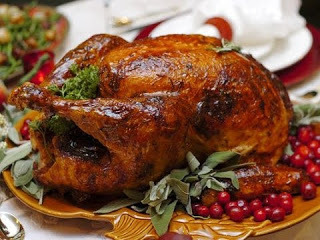
This weekend an emotional Brian Stelter, CNN’s host of ‘Reliable Sources’, predicted that many Thanksgiving dinners would be ruined by people whipping out their iPhones to prove a fake point. He urged viewers to be more discerning and to help each other to resist you Fake News. Facebook users, he said, should refuse to be used, journalists must be more vigilant.
A South African pundit was saying much the same on Aljazeera and President Obama was warning European heads of state of the dire consequences of social media propaganda.
Better than real news? Interestingly, in the last weeks of the US election campaign Buzzfeed News, revealed that you – whether claiming that the Pope had endorsed Trump, or that Clinton sold weapons to Isis – actually outperformed real news, with more shares, reactions and comments.

Another widely shared story used a young picture of Donald Trump with variations on a quote he reportedly gave People magazine in 1998. “If I were to run, I’d run as a Republican. They’re the dumbest group of voters in the country. They believe anything on Fox News. I could lie and they’d still eat it up. I bet my numbers would be terrific.”
It’s a serious situation and we can’t just tweet about it or angst on Facebook. Social media has enabled you, Fake News, to assume pandemic proportions but it’s far from a new phenomenon and I believe it’s time for all of us to take ownership of the situation to fend you off.
Not my fault.
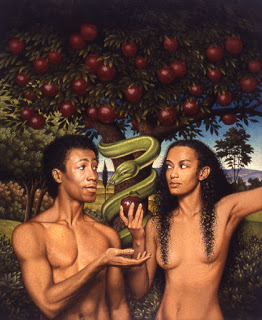
We can’t afford to do the Garden of Eden thing, where Adam blames Eve and Eve blames the snake and we blame you. Because just as countries across the globe are experiencing a swing to conservatism and populist leaders the Anglican Church could be sharing that experience.
The KISS principle (keep it simple stupid)According to Harry Farley, a Junior Staff Writer for Christian Today, conservative Anglican churches have bucked the trend of decline to show an increase in attendance over the past five years.
He claims the Church of England, as a whole, has seen a seven percent drop in the number of people at weekly services since 2010. But those churches with stricter teaching on issues such as the infallibility of the Bible, women priests and same-sex marriage report a dramatic increase in regular attendance.
If he is right, it means people don’t want reasoned religion. They don’t want to unpack the Bible by taking author, history and culture into consideration. They want their Christianity packaged as a no-nonsense brand.
Just checkingI’m waiting for the outcome of a global conference that is exploring the growth and decline of our Anglican communion.
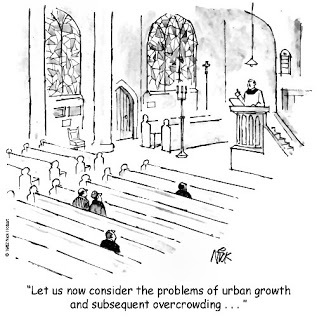
The key resource being a published study prepared by an international team of researchers across the five continents. There are 12 detailed case studies of Anglican churches in Australia, Congo, England, Ghana, Kenya, Nigeria, Singapore, South Africa, South America, South India, South Korea, and the US.
Grace Davie, professor emeritus of sociology at the University of Exeter, describes the book as “a veritable goldmine”, adding: “it contains a huge amount of mostly numerical information on the Anglican Communion in all its fullness.
“Quite rightly it eschews easy generalisations, probing instead the complex and evolving mosaic that constitutes modern Anglicanism. Almost every reader will be surprised about something.”
Guilty as chargedNot sure whether you’ve noticed but I have quoted conservative Christians to make this blog’s point. Yet I have previously slammed their stance on homosexuality and same-sex marriage. Have I cherry picked to suit myself? We all do it, determined to stay in the corners of our diversity unless it suits us.
It’s time to break that cycle.
I’d like to suggest that the starting point in the task of eradicating the Fake News pandemic is for religions to renew its focus on teaching about the importance of truth. We must stretch across the raging river of diversity.
We also need to stop using the Scriptures like a hoax site or a literal dictation from heaven. From an Anglican perspective, good theological education comes to mind. It should also be compulsory for our priests to follow news in order to identify relevant issues.
Let us remember that Anglicanism rests on the pillars of Faith, Scripture and Reason. Fortunately, or unfortunately, this makes it complex and not for the faint hearted. It’s why the Anglican Church always seems to be teetering on the edge of schism.
I also think it’s high time education curricula included social media and aspects such as cyber bullying and soft porn. To be sandwiched between ethics and how to fact check information.

BizarreSo much for us to do, so little time. I think I’ll pop outside and smell a rose or two if the drought hasn’t killed them off.
Besides, I need to meditate on a comment regarding Fake News in South Africa. William Bird of Media Monitoring Africa, says, "Much of our news is so bizarre that it could actually be fake."
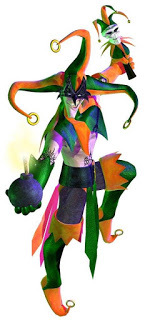
Published on November 22, 2016 07:55
November 14, 2016
THE RESCUE OF HALLELUJAH FROM RELIGION
Nick Baines, Bishop of Croydon, has declared the overused word hallelujah rescued from being "just a religious word" by poet and songwriter Leonard Cohen who died on November 7.
Discussing the legendary hit song on a BBC documentary, the bishop said, "We're broken human beings all of us, so stop pretending. We can all use hallelujah because it comes from being open and transparent before God and the world while saying 'This is how it is mate' "
In death Cohen's timing was impeccable. He couldn’t have wished for a better week in which to have an inevitable global focus on a powerful body of work – poetry and song – that stretched from the early 60s to a week in which....
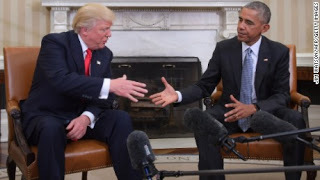
Donald Trump defied the pundits to become ‘President Elect’.
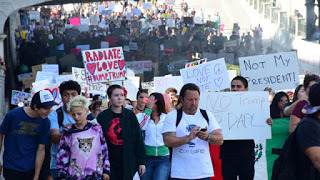
Hillary Clinton supporters wept and demonstrated.
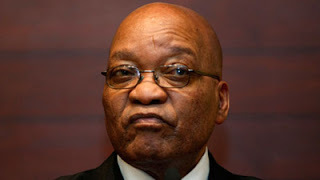
South Africa's Jacob Zuma survived yet another 'No Confidence Vote' as our young people marched for free higher education. 'Corruption' and 'State Capture' loomed large.
Planet TurmoilIn short, my world was in turmoil. My spirituality was in tatters. I was angry and disappointed.
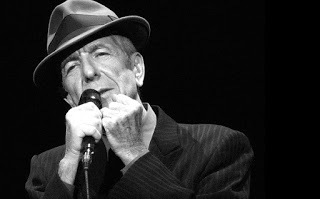
My solace came as tributes poured in for the 82-year-old poet, composer and singer, I was reminded of how his hit song Hallelujah had impacted on my spiritual journey, particularly as I began my middle-aged venture into Anglicanism and priesthood.
West Wing and ShrekEven if you are not a Cohen fan chances are you have heard the song, albeit on the popular West Wing series, watching Shrek with your kids or perhaps sung by the likes of Bob Dylan, Bon Jovi or Bono, who declared it “the best song in the world”.
Here's a short version of the lyrics:
Now I've heard there was a secret chordThat David played, and it pleased the LordBut you don't really care for music, do you?It goes like thisThe fourth, the fifthThe minor fall, the major liftThe baffled king composing HallelujahHallelujahHallelujahHallelujahHallelujah
Your faith was strong but you needed proofYou saw her bathing on the roofHer beauty and the moonlight overthrew herShe tied youTo a kitchen chairShe broke your throne, and she cut your hairAnd from your lips she drew the HallelujahHallelujahHallelujahHallelujahHallelujah
You say I took the name in vainI don't even know the nameBut if I did, well really, what's it to you?There's a blaze of lightIn every wordIt doesn't matter which you heardThe holy or the broken HallelujahHallelujahHallelujahHallelujahHallelujah
I did my best, it wasn't muchI couldn't feel, so I tried to touchI've told the truth, I didn't come to fool youAnd even thoughIt all went wrongI'll stand before the Lord of SongWith nothing on my tongue but HallelujahHallelujahHallelujahHallelujahHallelujah
The perfect and the brokenIncidentally, the song is broadcast at 2am every Saturday by the Israeli Defence Force's radio channel and Cohen once said of the song's meaning: "It explains that many kinds of hallelujahs do exist, and all the perfect and broken hallelujahs have equal value."
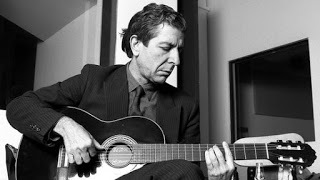
Not a born and bred Anglican, I don’t hum hymns under my breath when washing the dishes and Cohen’s Hallelujah was the only ‘hymn’ in my arsenal when I knocked at the Church’s door.
It would carry me through my questioning of why the Almighty needed praise. And it's interesting to note how often Cohen’s ‘psalm’ has been the focus of sermons within Judaism, Christianity and even Buddhism. (Cohen was a Buddhist monk for a time and re-entered the music world when he felt he had attained sufficient spiritual discipline.)
As Rabbi Michael Sternfield remarked at Chicago Sinai Congregation on the Day of Atonement in 2008, “One of the most overworked words in the Bibles of both Judaism and Christianity is ‘Hallelujah’, which literally means, ‘Praise God’. Even after all these years I still can’t understand why we need to praise God so much. Could God possible be so insecure that God needs to be told how great God is? Or worse, do we really believe that God is susceptible to flattery?”
Interestingly in the Jewish faith Hallelujah is a commandment to praise. In the Christian tradition, it is a word of praise.
The rabbi added that the more he listened to Cohen’s Hallelujah, “I have come to recognise the struggles many of us go through, especially on a night such as this, when we are expected to praise God but our hearts may not be in it”.
A reluctant song of praiseI agree with Rabbi Michael – Cohen’s Hallelujah is a reluctant song of praise, expressing gratitude in the midst of sorrow (and my political angst) it serves this broken time, our failures and disappointments. Maybe it’s not a song for the young who march in our cities but it resonates with my life experiences.
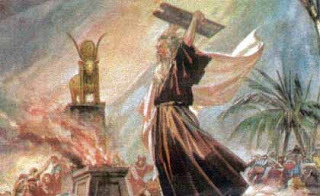
It also fits well with a rabbinic legend that when Moses descended from the mountain carrying the tablets with God’s Commandments. He was so distraught by how his people had behaved during his absence that he threw the tablets to the ground where they smashed into countless fragments.
When the people repented of their idolatry new tablets were made. Legend tells us both sets were then placed in the Ark and Rabbi Michael suggests that the Ark of the Covenant is our hearts which hold both the whole and the shattered elements of our lives.
As the rabbi emphasised, “In spite of all the pain and sadness we have known, still life is good, every day is a blessing and therefore we praise and express gratitude to God, even in our darkest hours.”
Birth of the blues

Bono, singer and Christian, once shared that the invocation of David resonated because, “I’ve thought a lot about him. He was a harp player and the first God heckler ….’Why hast thou forsaken me?’ That’s the beginning of the blues.”
Maybe it’s a good time for those of us battered by recent events to do some heckling of our own.
You will find a stack of erudite comments about Hallelujah’s musical composition on Google if you are interested. For me the comfort is in the poetry and Cohen’s assurance: “This world is full of conflicts and things that cannot be reconciled but there are moments when we can transcend the dualistic system and reconcile and embrace the whole mess, and that’s what I mean by Hallelujah.”
Flowers for HitlerPerhaps the pollsters who were embarrassed by Donald Trump’s win should reflect on Cohen’s poem Flowers for Hitler.
I quote: “what is most original in a man's nature is often that which is most desperate. thus, new systems are forced on the world by men who simply cannot bear the pain of living with what is. Creators care nothing for their systems except that they be unique. if Hitler had been born in Nazi Germany he wouldn't have been content to enjoy the atmosphere.”

As the poet pointed out, what’s the use of decrying the Holocaust, a Trump win or racism, if in our own lives we are cruel to others? If at our own dinner tables we are guilty of denigrated those who are different from us?
To the endIn October 2016, mere weeks before his death, Cohen released the album You Want It Darker. Severe back issues made it difficult for him to leave home so his son Adam placed a microphone on his dining room table and recorded him on a laptop. The album was met with rave reviews as the 82-year-old lived up to his maxim of never retiring.Adam says he continued composing to the very end and died with his sense of humour intact. Earlier, he reportedly said “I am ready to die," and added, "I hope it's not too uncomfortable. That's about it for me."Typically, when that crisis passed, he confessed to a tendency to exaggerate," "I’ve always been into self-dramatisation, I intend to live forever.”
Despite his Zen leanings the songwriter requested that he be laid to rest "in a traditional Jewish rite beside his parents, grandparents and great-grandparents.”
Maybe it’s a good time for those of us battered by recent events to examine who we are. to shout out “Hallelujah” and to heckle God for the strength to change our world.
Pass the safety pinOne last thought, I’ve decided to subscribe to the ‘Safety Pin movement’.

Huffington Post reports:In the wake of Donald Trump's election, many groups in the US, including African Americans, Muslims and women, are feeling scared and uneasy.Trump, who has said he would ban all Muslims from entering the US, made sexist and insulting comments about women and racist comments about people of color in America, is a frightening prospect for many Americans who believe he is unfit for office.So, while protests rage on across the country, one movement is using a simple yet powerful symbol to show their support for anyone who is fearful of what is to come.By fastening a safety pin to their clothing, people are declaring themselves allies to groups who have been maligned by Trump, to show that they stand in solidarity with anyone who might be afraid.Who knows what Donald Trump will do. Meanwhile, in South Africa the safety pin is fast emerging as a sign of solidarity against racism. Hallelujah! That works for me.
8
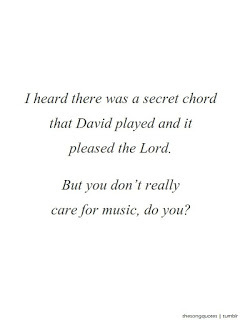
Just in case you haven't heard Hallelujah or you would like to hear it again, here's the link: https://www.youtube.com/watch?v=YrLk4vdY28Q
Published on November 14, 2016 00:07
October 3, 2016
THE EXCRUCIATING AGONY OF A CHRISTIAN CLOSET
As the dust settles on the Anglican Church in Southern Africa’s most recent synod, our Archbishop Thabo Makgoba is being quoted globally regarding the pain he is experiencing regarding the negative outcome of a decision not to allow our clergy to bless same sex marriages.
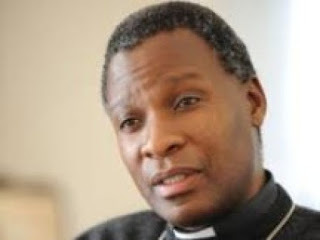 Archbishop Thabo Makgoba
Archbishop Thabo Makgoba Please note that I speak of a simple blessing, not marriage, yet 16 of 22 bishops voted against this. Archbishop Thabo speaks of a double edged sword.

Allow me to introduce a third edge...
As I write this, my own pain centres around an aspect seldom acknowledged - those gay Christians who actually believe their gender “leanings”, “temptations”, “preferences” are an abomination to be resisted. To the extent that they pray and fast their way out of their natural sexual identity in order to be saved. This, as a CNN journalist said about Aleppo, “It is what Hell is really like and then it got worse.”
 Aleppo
AleppoMarrying for JesusThese 'good' gay Christians all too often go to the extent marrying someone of the opposite sex.
Yes, many manage to be relatively happy, they love their spouses, their children, the holiness of family. But the need to suppress their sexual drive looms larger as the years pass. Inevitably their denial of self takes its toll on the relationship and mostly on the person committed to Christ and the Church. Some soldier on. Others don’t resist temptation and are caught. Others, in their maturity have stopped reading the Bible literally and decide to do the honourable thing by confessing to their spouses.
It seldom worksHaving counselled several of these committed Christians, all men admittedly, I am appalled at the trail of excruciating pain this can cause everyone from the family to the secret gay partner.
They were Anglicans, Methodists and Lutherans and, where love, mutual respect and concern for the children were dominant elements of the marriage, I witnessed some remarkable solutions. A generosity of soul not always found in our pews.
Other situations, involving righteous judgment and literal Scriptural interpretations, have left an unholy trail of devastation – fathers unjustly accused of pedophilia and banned from interaction with children they love deeply and who loved them the same way until their minds were poisoned and their emotional wellbeing was mortally wounded. Vocations had to be abandoned.
I'm not gayLet’s be clear: I’m not a Lesbian, trans or bi sexual. My children aren’t gay and I don’t’ have LGBTI siblings to campaign for. I wasn’t a gay activist before re-joining the Anglican Church 35 years after my Confirmation. I didn’t need to be one because nobody in my secular social circle was bothered with judging our gay friends or condemning them to hell. We were all too busy getting on with life. I had no concept of the hell too many Christian gays go through.
Called to priesthood at the turkey-necked age of 51, I was far more concerned with political activism. Desmond Tutu was an important role model and the main reason I asked to be trained in Soweto. Truth be told, I had visions of becoming the Mother Theresa of the townships. What arrogance and what ignorance of God’s sense of humour. I was too old to suit the Church’s pension fund so self-supporting ministry was my only option. In other words, I had to keep earning a living as a PR consultant.
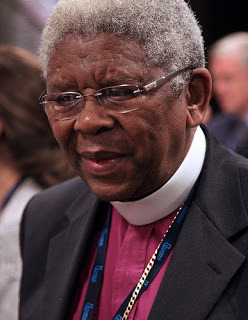 Archbishop Emeritus Njongonkulu Ndungane
Archbishop Emeritus Njongonkulu NdunganeIt’s how I became Archbishop Njongonkulu’s international media liaison consultant and how I jumped into the deep end of one of his signature ministries – HIV/AIDS.
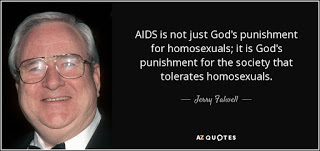 It's NOT...All this at a time when the disease was increasingly identified as punishment for homosexuality. That stigma became the incubator for millions of deaths. I thank God for ++Jongo who insisted on a communication campaign that would “shout from the roof tops that AIDS is an illness and, like any other, and is not a punishment from God.”
It's NOT...All this at a time when the disease was increasingly identified as punishment for homosexuality. That stigma became the incubator for millions of deaths. I thank God for ++Jongo who insisted on a communication campaign that would “shout from the roof tops that AIDS is an illness and, like any other, and is not a punishment from God.”A frightening number of Anglicans ignored the message.
The third edgeInevitably my personal ministry veered into that arena. Our national Health Department was refusing to provide antiretrovirals. I was clocking up funeral services at an alarming rate and working with passionate activists, several of whom were Anglican priests and gay. Some were infected others weren’t, all suffered the pain of being open about their sexuality in a Christian environment.

I had stepped into the realm of the "third edge”.
More broad minded?But I was not your typical Anglican priest: I hadn’t attended church for 35 years; I was battling to curb a vocabulary learned in a news room (still am); I was a divorcee who had had two long term live-in relationships; and, I loved to party. Perhaps it is because my gay associates felt I would be more understanding that they began recommending me to married gay men seeking counselling.
What a learning curve for me. I encountered an awful aspect of Christian cruelty, good intentions gone awry and responses that caused excruciating pain to EVERYONE in the affected family and even their extended families.
Can you begin to imagine the pain of being rejected by a Church that is part of your DNA?
And don’t for one millisecond think you can crack it with “Love the sinner, hate the sin.” It is that very approach that gnaws at family and friends who fill our pews and share Communion. We hurt them by judging their loved ones and relegating them to hellfire.
How we must hurt the Tutus
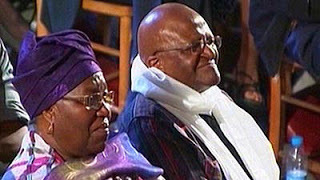 Leah and Desmond Tutu
Leah and Desmond Tutu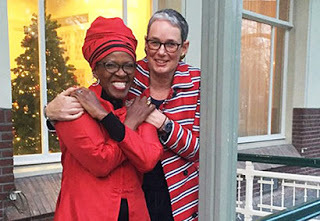 Revd Mpho von Furth Tutu and her wife, Marceline
Revd Mpho von Furth Tutu and her wife, MarcelineI worry about the hurt Desmond and Leah Tutu must feel because since her marriage their daughter Revd Mpho is not licensed in Southern Africa. Yes, she could return to the USA and minister there but her parents are in their twilight years and the Desmond and Leah Tutu Foundation needs her management.
Time to revolt?I never bothered to become a marriage officer and I applauded priests who refused to act as marriage officers when mixed race marriages were banned. I now applaud those who either ignore the ‘gay’ rules or are heeding the call to hand in their licences.
Too many of my brother and sister priests have gone through 30 years of the Anglican Church saying “soon there will be a breakthrough.” Too many have battled the Church’s trade-off: “be celibate and you can be licensed to be a priest”.
If social demographics apply, some 10% of our priests are gay. Maybe more because it makes so much sense for God to call natural nurturers into our vocation.
Older and wiserI do, however, take comfort from the fact that age invariably brings a more mature interpretation of Scripture and greater confidence in the findings of modern science as well as confidence in God’s abiding love.
As Rabbi Dr Jay Michaelson Ph.D. writes in Behold I make all things New, “God versus Gay isn’t just a false dichotomy. It’s a rebellion against the image of God itself.”
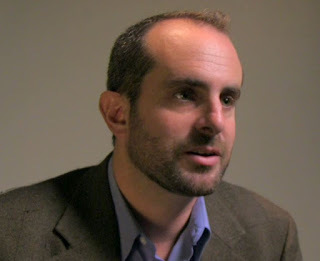 Rabbi Dr Jay Michaelson
Rabbi Dr Jay MichaelsonAllow me to share more of the rabbi’s quotes: “As a rabbi and long-time LGBT activist, I’ve counselled many Orthodox young people who are terrified of having to choose between happiness and their religious way of life. Families have been torn apart by this issue and as long as the false choice between God and gay persists, our brothers, sisters, cousins, and friends will continue to struggle. They will torment themselves and be excluded from their families and communities.”
“Before I came out, I was certain that being openly gay would spell the end of my religious life. I was an Orthodox-practicing Jew which gave meaning and shape to my life. I repressed my sexuality, acting out occasionally but regretting it afterwards. I tried, for years, to change. Eventually, after 10 years in the closet I had had enough. The pain, isolation, loneliness, and shame had grown so great that I was ready to forsake my religion for the sake of my happiness.”
“Coming out was the doorway to greater religious faith and joy than I had ever imagined. My relationship with God and my religious community grew stronger. My spiritual path began to unfold; my prayer life began to awaken. My love for other human beings slowly unfurled and expanded.”
“Imagine believing that because of something you cannot change God hates you.”
“Whose fault is it that 40% of gay teenagers consider suicide – four times as many as straight kids? Ours, of course.”
"It's not African"I know that a number of the bishops at the synod hailed from countries far more conservative than South Africa, where same sex marriages are legal, but I quote a Nigerian, The Revd. Rowland ‘Jide’ Macaulay LLB, MTh, “Historically, Africa has always been the friendliest and most tolerant continent. Homosexuality and same-gender behaviours date back to before colonialism and the intervention of religion. The arrival of colonialism contributed to the mass hatred and also the influence of religious fundamentalism. Itcontributed to the debased argument for homophobia. Yet Christianity teaches and encourages Love thy neighbour as thyself.”
I am busy working on a manuscript that examines how faiths based on rebirth and karma -Buddhism, Jainism, Sikhism, and Hinduism – affirm the dignity of queer identities and sexualities. In it Devdutt Pattanaik, author of more than 30 best-selling books and lecturer on the relevance of mythology in modern times, says “the well-meaning doctrine of ‘all religions are the same in essence’ has led to the assumption that all religions are intolerant of all things LGBTIQ.”
He adds, “When faiths affirm the dignity of the queer, they empower them psychologically, politically, and economically.”
That third edge In all this let us not lose sight of the third edge of the sword the Anglican Church continues to wield. I have watched young priests grow old while waiting to be affirmed. One of the saddest stories I was told was how, many years ago, seminarians were told that a bishop was refusing to ordain single priests.
The young man, fighting his gay sexuality, proposed marriage to a woman who knew about his personal battle, but also believed they would conquer all through prayer and faithfulness to the Church.
As it turned out, in order to have sex, and for her to conceive, he would have to read porn and then pounce on her as he was about to climax. Of course the marriage didn't last.
As the Lord says:“My people, what have I done to you?”
*********Watch Mpho Tutu van Furth speak about human sexuality and her marriage -
https://www.youtube.com/watch?v=dsL0kBJAy2s
Published on October 03, 2016 02:09
July 15, 2016
WE ARE IN A DITCH DOLLS!
If ever there was proof that God has a sense of humour it was when I was ordained to priesthood. When I hit the half century mark Church wasn’t on my bucket list, I was saving for a world cruise on the QE2. God was more likely to be mentioned when I stubbed my toe and Jesus didn’t really appeal other than to discuss whether he and Mary Magdalene had had sex.
Nonetheless, as I began attending services at St Martin’s-in-the-Veld, Joburg, I had that ‘new convert’s’ romantic perception of religion and clergy. Probably a hang-over from my convent boarding school days when the only posters we stuck on our walls were of the pope and various saints.

So I was quite shocked when a woman who had dealings with the higher echelons of the Anglican Church in Southern Africa made disparaging remarks about clergy who “slept around” and “reallocated” funds.
It was the best thing that could have happened to me.
With my rose tinted glasses relegated to the dustbin and a healthy dose of cynicism I came to understand that Church is, at best, a messy organisation – a peculiar balance of humanity at its best and its worst. If you are looking for miracles, look no further than your nearest parish and how it has survived personality clashes and varying levels of competence, humility and servanthood.
Ignorance is…But the years passed and I’ve been jogging along with a sense of ‘knowing the Church’. Then the One with the quirky sense of humour had yet another belly laugh as I began writing my mystery series. Having worked as Archbishop Njongo’s media liaison person for seven years and been a Susan Howatch fan, my first novel was inevitably set within Church. The main protagonist is a former PR guru testing a calling to a monastic vocation but who has to solve a couple of murders with the help of the folk running the agency. Alec Fergusson is white middle aged and a doddle for me to write about.
A strange thingThen, as I began the next novel, a strange thing happened. Alec began taking a back seat as Archbishop Shakes Khumalo assumed centre stage. At first I wasn’t too bothered. After all I’d spent many years within the ANC, I’d trained for priesthood in Soweto, I’d worked for Archbishop Njongo. It also helped that Shakes spent several years in the UK where he studied Law.
Of course I could write from a black archbishop's perspective.
But as Shakes drew me into his worldview I came to understand how much I still have to learn. How patient my black friends and associates have been with me all these years and why I have to rely on black editors to help keep Shakes credible.
There’s no turning back. The series belongs to Shakes and its meant to be a fun read. But against the backdrop of the #blacklivesmatter vs #alllivesmatter debate and at a deeply personal level, I know that I have to dig ever deeper into his world. Not because it will make him more credible but because I must.
A wake up callMy unease increased when I shared this Facebook post,
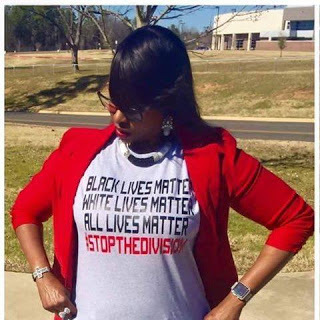
and a dear friend responded ‘Black lives matter’.
That brought me up short.
The following morning at around 4:27 I watched a CNN interview with Dr Brian Williams, the black trauma surgeon who had treated the Dallas policemen shot during a Black Lives Matter protest march.
Emphasising that he didn’t want to detract from the pain of the slain officers’ families, Dr Williams told how he too feared for his life outside the hospital. He spoke of the need for more open discussion about race. “How can we understand each other better,” he asked. “We need to stop talking over each other, to truly listen to the other side, to not shut each other out.”
Other interviews followed and, as the slow winter dawn stretched across Kommetjie, I came to understand that until and unless we erase the vulnerability of and dehumanisation of black people, all lives can’t matter.
As with all cataclysmic events an iconic picture emerges. My bet is that this is the one that will epitomise the Black Lives Matter movement.
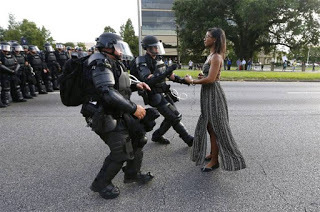
Facebook user R. Alex Haynes posted: “This is my best friend that I have known since we were 8 (20 years now). “Her name is Leshia and she has a 5-year-old son. She went to Baton Rouge because she wanted to look her son in the eyes to tell him she fought for his freedom and rights. They haven’t released her as of yet but she’s fine.”
Hopefully, the US discussions on racism will spill over into South Africa where the sin of differentiation and privilege bubbles and boils.
Where is Church in all this?The Anglican (Episcopal) Church in Southern Africa has transformed, If I’d made Shakes white, he wouldn’t have been credible. But I am acutely conscious of the cringe-worthy unconscious racism that still exists among clergy and laity alike. It’s a spin-off of privilege, the sense of white is right and better. (Anyone tried to introduce choruses in a traditionally white parish lately? ever wondered why so few black parishioners serve on committees?)
Of course there are exceptions but, while we Anglicans don’t usually sink to the depths of the preacher from another denomination who told his congregation that white people were better off because they work harder, we have at many levels yet to truly listen to each other. To respect each other. To see God in each other.
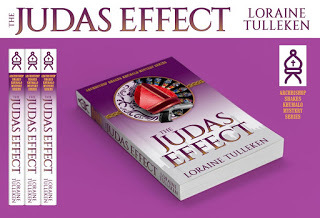
Because I haven’t made the Shakes series a soapbox for racism it is in the detail of his life that I am made aware of his daily realities. The white suffragan bishop who disapproves of any efforts to “Africanise” the Church. The difficulty he has in dealing with an apartheid era security operative and his guilt for abandoning his Sowetan boyhood friends on his journey to success – first as an advocate and then as a church man.
Yet again, God has nudged me out of my comfort zone.
Not the SamaritanI felt this as I preached on the Good Samaritan last Sunday. I’d filled an emergency pulpit gap and was relieved to find it such an easy reading. But no matter how I leaned on past interpretations this nagging voice kept saying “it’s about being in the ditch.” I realised that for too long I’d viewed myself, my congregants and my Church as the Samaritan – duty bound to minister to those in need and less privileged.
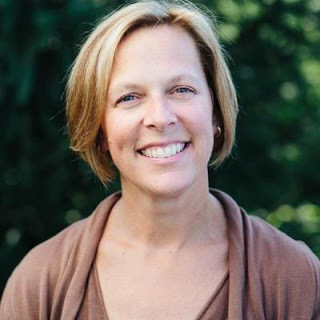
The Revd Dr Marcia Mount Shoop
In the US the Revd Dr Marcia Mount Shoop, preached that same day on the same reading at the Grace Covenant Presbyterian Church in Asheville North Carolina . A consultant, author, and theologian who focuses on healing and spiritual growth around issues of violence, race, power, privilege and loss, she was far more eloquent than I was in Ocean View Cape Town.
A moral ambivalenceAddressing white supremacy and the moral ambivalence of white dominant institutions around race and power question she urged, “Brothers and sisters in Christ, we are at a crossroads as a nation and as a faith. The road behind us is washed out—we cannot go back, we cannot un-see what we have seen, we cannot deny the blood on our hands, we cannot deny the moral ambivalence around the very category of full humanity that rests at the foundation of our most hallowed institutions—our justice system, our education system, our government, our economic system, and yes, even the church.”
She spoke of how duty is an attempt to tidy up the ambiguity of our human situation. “And while our human minds like simple, clear, non-negotiable answers to life’s most complicated questions, ambiguity abides—and calls us to a deeper place from which to define our morality, our responsibility, indeed our humanity. Far deeper than our learned reflexes of duty is our blood chilling vulnerability: mine, yours, ours.”
Snoop elaborated, “And while the normative culture of mainline Christianity has taught us the language of helping the “least of these,” white culture, white patriarchal culture has told us lies: that we can somehow secure our safety, our well-being on the backs of others and make ourselves less vulnerable than everyone else. As white dominant institutions, Mainline churches have not often considered our own profound vulnerability.
“What if we are not the Good Samaritan? What if we are naked, barely conscious, and beaten within an inch of our lives on the side of the road? ….. What if being Jesus followers is less about being the one with the power to help and more about telling the truth of just how vulnerable we really are? This is not duty. This is not pity. This is our humanity.
“White culture has distorted our shared humanity and our full humanity because it formed us with an expectation of safety and self-protection. White culture has tried to tell us we can erase our vulnerability, our grief, our fragility, our uniqueness, our idiosyncrasy—and from this attempted erasure we have learned repetitive, dehumanizing habits. We are habituated to ask “How can we help?” But rarely do we ask, “How can we change? How can we be the change?”
“White supremacy is a powerful demon that must be exorcised. This does not mean all white people are bad, this means the culture spawned by white supremacy is a disease that afflicts us all—it permeates our instincts, our muscle twitches, our gut reactions, our intimacy, our self-understanding. Jesus, help us, help us not be afraid to tell you the truth of our affliction.”
For her full sermon go to: http://ow.ly/bwPj302gNlI
Or maybe we should all simply watch this 14 year old white boy's You Tube video:
http://ow.ly/QNpX302h0tI
Published on July 15, 2016 03:37



